- Privacy Policy

Home » 300+ Social Media Research Topics

300+ Social Media Research Topics

Social media has become an integral part of our lives, and it has transformed the way we communicate, share information, and interact with each other. As social media platforms continue to evolve and gain popularity, they have also become a rich source of data for researchers. Social media research is a rapidly growing field that encompasses a wide range of topics , from understanding the psychological and social effects of social media to analyzing patterns of user behavior and identifying trends in online conversations. In this era of data-driven decision-making, social media research is more important than ever, as it provides insights into how we use and are influenced by social media. In this post, we will explore some of the most fascinating and relevant social media research topics that are shaping our understanding of this powerful medium.
Social Media Research Topics
Social Media Research Topics are as follows:
- The effects of social media on mental health
- The role of social media in political polarization
- The impact of social media on relationships
- The use of social media by businesses for marketing
- The effects of social media on body image and self-esteem
- The influence of social media on consumer behavior
- The use of social media for education
- The effects of social media on language use and grammar
- The impact of social media on news consumption
- The role of social media in activism and social change
- The use of social media for job seeking and career development
- The effects of social media on sleep patterns
- The influence of social media on adolescent behavior
- The impact of social media on the spread of misinformation
- The use of social media for personal branding
- The effects of social media on political participation
- The influence of social media on fashion trends
- The impact of social media on sports fandom
- The use of social media for mental health support
- The effects of social media on creativity
- The role of social media in cultural exchange
- The impact of social media on language learning
- The use of social media for crisis communication
- The effects of social media on privacy and security
- The influence of social media on diet and exercise behavior
- The impact of social media on travel behavior
- The use of social media for citizen journalism
- The effects of social media on political accountability
- The role of social media in peer pressure
- The impact of social media on romantic relationships
- The use of social media for community building
- The effects of social media on gender identity
- The influence of social media on music consumption
- The impact of social media on academic performance
- The use of social media for social support
- The effects of social media on social skills
- The role of social media in disaster response
- The impact of social media on nostalgia and memory
- The use of social media for charity and philanthropy
- The effects of social media on political polarization in developing countries
- The influence of social media on literary consumption
- The impact of social media on family relationships
- The use of social media for citizen science
- The effects of social media on cultural identity
- The role of social media in promoting healthy behaviors
- The impact of social media on language diversity
- The use of social media for environmental activism
- The effects of social media on attention span
- The influence of social media on art consumption
- The impact of social media on cultural values and norms.
- The impact of social media on mental health
- The impact of social media on mental health.
- The impact of social media on body image and self-esteem.
- The use of social media for political activism and social justice movements.
- The role of social media in promoting cultural diversity and inclusivity.
- The impact of social media on romantic relationships and dating.
- The use of social media for customer service and support.
- The impact of social media on mental health and well-being among young adults.
- The impact of social media on political polarization and partisanship.
- The use of social media for health communication and behavior change.
- The role of social media in shaping public opinion and attitudes towards vaccination.
- The impact of social media on political participation and civic engagement.
- The impact of social media on political polarization and echo chambers.
- The use of social media for political campaigning and the manipulation of public opinion.
- The role of social media in shaping public attitudes towards vaccination and public health.
- The impact of social media on news consumption and trust in journalism.
- The use of social media for promoting sustainable fashion practices and ethical consumption.
- The role of social media in influencing beauty standards and body image.
- The impact of social media on the music industry and the role of social media influencers.
- The use of social media for promoting mental health and well-being among healthcare professionals.
- The role of social media in shaping public attitudes towards gun violence and gun control policies.
- The impact of social media on social activism and advocacy.
- The use of social media for promoting cross-cultural communication and intercultural understanding.
- The role of social media in shaping public attitudes towards climate change and environmental policies.
- The impact of social media on public health during the COVID-19 pandemic.
- The use of social media for promoting financial literacy and access to financial services for low-income individuals.
- The role of social media in shaping public attitudes towards immigration policies and refugee crises.
- The impact of social media on political activism and social movements.
- The use of social media for promoting digital literacy and technology education in developing countries.
- The role of social media in shaping public attitudes towards gender and sexual orientation.
- The impact of social media on consumer behavior in the food and beverage industry.
- The use of social media for promoting mental health and well-being among first responders.
- The role of social media in shaping public attitudes towards racial justice and police brutality.
- The impact of social media on privacy concerns and data security.
- The use of social media for promoting interfaith dialogue and religious tolerance.
- The role of social media in shaping public attitudes towards income inequality and economic justice.
- The impact of social media on the film and television industry and consumer behavior.
- The use of social media for promoting mental health and well-being among military personnel.
- The role of social media in shaping public attitudes towards privacy and data security.
- The impact of social media on the hospitality industry and consumer behavior.
- The use of social media for promoting intergenerational communication and understanding.
- The role of social media in shaping public attitudes towards animal welfare and animal rights.
- The impact of social media on the gaming industry and gamer behavior.
- The use of social media for promoting digital literacy and technology skills among seniors.
- The role of social media in shaping public attitudes towards renewable energy and sustainability.
- The impact of social media on the advertising industry and consumer behavior.
- The use of social media for promoting mental health and well-being among children and adolescents.
- The role of social media in shaping public attitudes towards online privacy and security.
- The impact of social media on the beauty industry and consumer behavior.
- The use of social media for promoting cultural preservation and heritage tourism.
- The role of social media in shaping public attitudes towards criminal justice reform.
- The impact of social media on the automotive industry and consumer behavior.
- The use of social media for promoting mental health and well-being among marginalized communities.
- The role of social media in shaping public attitudes towards sustainable development goals.
- The impact of social media on the fashion industry and consumer behavior.
- The use of social media for promoting intercultural communication in the workplace.
- The role of social media in shaping public attitudes towards mental health policies.
- The impact of social media on the travel industry and sustainable tourism practices.
- The use of social media for health information seeking and patient empowerment.
- The role of social media in promoting environmental activism and sustainable practices.
- The impact of social media on consumer behavior and brand loyalty.
- The use of social media for promoting education and lifelong learning.
- The role of social media in shaping public opinion and attitudes towards mental health issues.
- The impact of social media on the fashion industry and fast fashion practices.
- The use of social media for promoting social entrepreneurship and social innovation.
- The role of social media in shaping public opinion and attitudes towards gun control.
- The impact of social media on the mental health and well-being of adolescents.
- The use of social media for promoting intercultural exchange and understanding.
- The role of social media in shaping public opinion and attitudes towards climate change.
- The impact of social media on political advertising and campaign strategies.
- The use of social media for promoting healthy relationships and communication skills.
- The role of social media in shaping public opinion and attitudes towards police brutality and racial justice.
- The use of social media for promoting financial literacy and personal finance management.
- The role of social media in shaping public opinion and attitudes towards LGBTQ+ rights.
- The impact of social media on the music industry and fan engagement.
- The use of social media for promoting mental health and well-being among marginalized populations.
- The role of social media in shaping public opinion and attitudes towards immigration and border policies.
- The impact of social media on the professional development and networking of journalists.
- The use of social media for promoting community building and social cohesion.
- The role of social media in shaping public opinion and attitudes towards healthcare policies.
- The impact of social media on the food industry and consumer behavior.
- The role of social media in shaping public opinion and attitudes towards gender equality.
- The impact of social media on the sports industry and athlete-fan interactions.
- The use of social media for promoting financial inclusion and access to banking services.
- The role of social media in shaping public opinion and attitudes towards animal welfare.
- The use of social media for promoting mental health and well-being among college students.
- The role of social media in shaping public opinion and attitudes towards privacy and data security.
- The role of social media in shaping public opinion and attitudes towards income inequality and poverty.
- The use of social media for promoting digital literacy and technology skills.
- The role of social media in shaping public opinion and attitudes towards renewable energy.
- The use of social media for promoting mental health and well-being among elderly populations.
- The role of social media in shaping public opinion and attitudes towards online privacy and security.
- The role of social media in shaping public opinion and attitudes towards criminal justice reform.
- The impact of social media on online activism and social movements.
- The use of social media for business-to-business communication and networking.
- The role of social media in promoting civic education and engagement.
- The impact of social media on the fashion industry and sustainable fashion practices.
- The use of social media for promoting cultural diversity and inclusion.
- The role of social media in shaping public opinion and attitudes towards police reform.
- The impact of social media on the mental health and well-being of frontline healthcare workers.
- The use of social media for promoting financial literacy and investment education.
- The role of social media in promoting environmental sustainability and conservation.
- The impact of social media on body image and self-esteem among adolescent girls.
- The use of social media for promoting intercultural dialogue and understanding.
- The role of social media in shaping public opinion and attitudes towards immigration policies and refugees.
- The impact of social media on the professional development and networking of healthcare professionals.
- The use of social media for promoting community resilience and disaster preparedness.
- The role of social media in shaping public opinion and attitudes towards the Black Lives Matter movement.
- The impact of social media on the music industry and artist-fan interactions.
- The use of social media for promoting healthy eating habits and nutrition education.
- The role of social media in promoting mental health and well-being among college students.
- The impact of social media on the entertainment industry and consumer behavior.
- The use of social media for promoting workplace diversity and inclusion.
- The role of social media in shaping public opinion and attitudes towards climate change policies.
- The impact of social media on the travel industry and consumer behavior.
- The use of social media for promoting mental health and well-being among military veterans.
- The role of social media in promoting intergenerational dialogue and understanding.
- The impact of social media on the professional development and networking of educators.
- The use of social media for promoting animal welfare and advocacy.
- The role of social media in shaping public opinion and attitudes towards reproductive rights.
- The impact of social media on the sports industry and fan behavior.
- The use of social media for promoting financial inclusion and literacy among underprivileged populations.
- The role of social media in promoting mental health and well-being among LGBTQ+ populations.
- The impact of social media on the food and beverage industry and consumer behavior.
- The use of social media for promoting interfaith dialogue and understanding.
- The role of social media in shaping public opinion and attitudes towards gun ownership.
- The use of social media for promoting mental health and well-being among caregivers.
- The role of social media in promoting sustainable tourism practices.
- The impact of social media on the gaming industry and gamer culture.
- The use of social media for promoting cultural heritage tourism and preservation.
- The role of social media in shaping public opinion and attitudes towards public transportation policies.
- The use of social media for promoting mental health and well-being among homeless populations.
- The role of social media in promoting mental health and well-being among immigrants and refugees.
- The use of social media for promoting financial literacy and entrepreneurship among youth.
- The use of social media for political mobilization and participation in authoritarian regimes.
- The role of social media in shaping public opinion and attitudes towards immigration policies.
- The impact of social media on the professional development of teachers and educators.
- The use of social media for emergency communication during public health crises.
- The role of social media in promoting LGBTQ+ rights and advocacy.
- The impact of social media on body positivity and self-acceptance among women.
- The use of social media for public diplomacy and international relations.
- The impact of social media on the mental health and well-being of marginalized communities.
- The use of social media for crisis management and disaster response in the corporate sector.
- The role of social media in promoting environmental activism and conservation.
- The impact of social media on the professional development and networking of entrepreneurs.
- The use of social media for medical education and healthcare communication.
- The role of social media in promoting cultural exchange and understanding.
- The impact of social media on social capital and civic engagement among young adults.
- The use of social media for disaster preparedness and community resilience.
- The role of social media in promoting religious pluralism and tolerance.
- The use of social media for promoting healthy lifestyles and wellness.
- The use of social media for fundraising and philanthropy in the non-profit sector.
- The role of social media in promoting interfaith dialogue and understanding.
- The impact of social media on the travel and tourism industry and consumer behavior.
- The use of social media for customer engagement and brand loyalty in the retail sector.
- The impact of social media on the political attitudes and behaviors of young adults.
- The use of social media for promoting gender equality and women’s empowerment.
- The use of social media for promoting animal welfare and adoption.
- The role of social media in promoting mental health and well-being among the elderly.
- The impact of social media on the art industry and artist-fan interactions.
- The use of social media for promoting healthy food choices and nutrition.
- The role of social media in shaping public opinion and attitudes towards income inequality.
- The use of social media for promoting political satire and humor.
- The role of social media in promoting disability rights and advocacy.
- The use of social media for promoting voter registration and participation.
- The role of social media in promoting entrepreneurship and small business development.
- The use of social media for promoting mental health and well-being among incarcerated populations.
- The role of social media in shaping public opinion and attitudes towards gun violence prevention.
- The use of social media for promoting cultural heritage and preservation.
- The impact of social media on mental health and well-being.
- The relationship between social media use and academic performance.
- The use of social media for emergency communication during natural disasters.
- The impact of social media on traditional news media and journalism.
- The role of social media in shaping public opinion and discourse.
- The use of social media for online learning and education.
- The impact of social media on the fashion and beauty industry.
- The use of social media for brand awareness and marketing.
- The impact of social media on privacy and security.
- The use of social media for job searching and recruitment.
- The impact of social media on political polarization and extremism.
- The use of social media for online harassment and cyberbullying.
- The role of social media in promoting environmental awareness and sustainability.
- The impact of social media on youth culture and identity formation.
- The use of social media for travel and tourism marketing.
- The impact of social media on consumer behavior and decision-making.
- The role of social media in shaping beauty standards and body positivity.
- The use of social media for crisis communication and disaster response.
- The impact of social media on the music industry.
- The use of social media for fundraising and philanthropy.
- The role of social media in promoting healthy lifestyles and wellness.
- The impact of social media on sports fandom and fan behavior.
- The use of social media for political lobbying and advocacy.
- The impact of social media on the entertainment industry.
- The use of social media for healthcare communication and patient engagement.
- The role of social media in promoting gender equality and feminism.
- The impact of social media on the restaurant and food industry.
- The use of social media for volunteerism and community service.
- The role of social media in promoting religious tolerance and interfaith dialogue.
- The impact of social media on the art industry.
- The use of social media for political satire and humor.
- The role of social media in promoting disability awareness and advocacy.
- The impact of social media on the real estate industry.
- The use of social media for legal advocacy and justice reform.
- The role of social media in promoting intercultural communication and understanding.
- The impact of social media on the automotive industry.
- The use of social media for pet adoption and animal welfare advocacy.
- The role of social media in promoting mental health and wellness for marginalized communities.
- The impact of social media on the retail industry.
- The use of social media for promoting civic engagement and voter participation.
- The impact of social media on the film and television industry.
- The use of social media for fashion and style inspiration.
- The role of social media in promoting activism for human rights and social issues.
- The effectiveness of social media for political campaigns.
- The role of social media in promoting fake news and misinformation.
- The impact of social media on self-esteem and body image.
- The impact of social media on romantic relationships.
- The use of social media for online activism and social justice movements.
- The impact of social media on traditional news media.
- The impact of social media on interpersonal communication skills.
- The impact of social media on the fashion industry.
- The use of social media for social support and mental health awareness.
- The use of social media for political lobbying and activism.
- The impact of social media on travel and tourism behavior.
- The use of social media for customer feedback and market research.
- The impact of social media on the restaurant industry.
- The role of social media in political activism
- The effect of social media on interpersonal communication
- The relationship between social media use and body image concerns
- The impact of social media on self-esteem
- The role of social media in shaping cultural norms and values
- The use of social media by celebrities and its impact on their image
- The role of social media in building and maintaining personal relationships
- The use of social media for job searching and recruitment
- The impact of social media on children and adolescents
- The use of social media by political candidates during election campaigns
- The role of social media in education
- The impact of social media on political polarization
- The use of social media for news consumption
- The effect of social media on sleep habits
- The use of social media by non-profit organizations for fundraising
- The role of social media in shaping public opinion
- The influence of social media on language and communication patterns
- The use of social media in crisis communication and emergency management
- The role of social media in promoting environmental awareness
- The influence of social media on music preferences
- The impact of social media on body positivity movements
- The role of social media in shaping beauty standards
- The influence of social media on sports fandom
- The use of social media for health promotion and education
- The impact of social media on political participation
- The role of social media in shaping parenting practices
- The influence of social media on food preferences and eating habits
- The use of social media for peer support and mental health advocacy
- The role of social media in shaping religious beliefs and practices
- The influence of social media on humor and comedy
- The use of social media for online activism and social justice advocacy
- The impact of social media on public health awareness campaigns
- The role of social media in promoting cultural diversity and inclusion
- The influence of social media on travel behavior and decision-making
- The use of social media for international diplomacy and relations
- The impact of social media on job satisfaction and employee engagement
- The role of social media in shaping romantic preferences and dating behavior
- The influence of social media on language learning and language use
- The use of social media for political satire and humor
- The impact of social media on social capital and community building
- The role of social media in shaping gender identity and expression
- The influence of social media on fashion and beauty advertising.
About the author
Muhammad Hassan
Researcher, Academic Writer, Web developer
You may also like

500+ Nursing Research Topic Ideas

500+ Sports Research Topics

500+ Argumentative Research Paper Topics

1000+ Sociology Research Topics

500+ Physics Research Topics

500+ Qualitative Research Titles and Topics

Presentations made painless
- Get Premium
121 Social Media Essay Topic Ideas & Examples
Inside This Article
Social media has become an integral part of our daily lives, shaping how we communicate, share information, and interact with others. With the rise of platforms like Facebook, Twitter, Instagram, and TikTok, the way we connect with one another has evolved drastically. As a result, social media has also become a popular topic for essays and research papers. If you're looking for inspiration for your next social media essay, here are 121 topic ideas and examples to get you started.
- The impact of social media on mental health
- The role of social media in politics
- The influence of social media on body image
- How social media has changed the way we communicate
- The rise of influencer culture on social media
- The effects of cyberbullying on social media
- The role of social media in promoting activism and social justice
- How social media has changed the way we consume news
- The relationship between social media and self-esteem
- The impact of social media on relationships
- The role of social media in shaping cultural trends
- The effects of social media on sleep patterns
- The influence of social media on consumer behavior
- The rise of fake news on social media
- The role of social media in education
- The impact of social media on democracy
- The effects of social media on creativity
- The relationship between social media and mental health stigma
- The role of social media in shaping political opinions
- The influence of social media on young people's perceptions of beauty
- The effects of social media on privacy
- The impact of social media on social skills
- The role of social media in promoting diversity and inclusion
- The relationship between social media and loneliness
- The effects of social media on body positivity movements
- The influence of social media on fashion trends
- The rise of social media activism
- The impact of social media on youth culture
- The role of social media in shaping public opinion
- The effects of social media on political polarization
- The relationship between social media and fake news
- The influence of social media on online shopping habits
- The impact of social media on mental health awareness
- The role of social media in promoting environmental activism
- The effects of social media on self-expression
- The relationship between social media and cyberbullying prevention
- The influence of social media on body positivity movements
- The rise of social media influencers
- The impact of social media on political activism
- The role of social media in promoting mental health resources
- The effects of social media on political discourse
- The relationship between social media and online dating
- The influence of social media on travel trends
- The impact of social media on public health campaigns
- The role of social media in promoting positive body image
- The effects of social media on political engagement
- The relationship between social media and social movements
- The influence of social media on celebrity culture
- The rise of social media marketing
- The impact of social media on community building
- The role of social media in promoting mental health awareness
- The effects of social media on societal norms
- The relationship between social media and political propaganda
- The influence of social media on youth activism
- The impact of social media on mental health stigma
- The role of social media in shaping online communities
- The effects of social media on body image perception
- The relationship between social media and mental health advocacy
- The influence of social media on political mobilization
- The rise of social media influencers in the beauty industry
- The impact of social media on political polarization
- The role of social media in promoting environmental sustainability
- The effects of social media on self-esteem
- The relationship between social media and online shopping habits
- The influence of social media on celebrity endorsements
- The rise of social media activism in response to social injustices
- The impact of social media on mental health treatment
- The role of social media in promoting healthy living
- The effects of social media on political campaigns
- The relationship between social media and online activism
- The influence of social media on travel influencers
- The impact of social media on mental health education
- The role of social media in promoting body positivity
- The effects of social media on political participation
- The relationship between social media and body image issues
- The influence of social media on online shopping trends
- The rise of social media influencers in the fitness industry
- The impact of social media on political discourse
- The effects of social media on societal values
- The relationship between social media and political polarization
- The influence of social media on youth engagement
- The rise of social media activism in response to climate change
- The relationship between social media and social justice movements
- The rise of social media marketing in the beauty industry
These are just a few examples of the countless topics you can explore when writing about social media. Whether you're interested in the psychological effects of social media or the ways it has impacted political discourse, there's no shortage of ideas to choose from. So, pick a topic that interests you and start writing your next social media essay today!
Want to create a presentation now?
Instantly Create A Deck
Let PitchGrade do this for me
Hassle Free
We will create your text and designs for you. Sit back and relax while we do the work.
Explore More Content
- Privacy Policy
- Terms of Service
© 2023 Pitchgrade
234 Social Media Research Topics & Ideas
- Icon Calendar 18 May 2024
- Icon Page 2646 words
- Icon Clock 12 min read
Social media research encompasses a broad range of different topics that delve into the ever-evolving digital landscape. People investigate the impact of social platforms on society, exploring subjects, such as online identity formation, self-presentation, the psychology of virtual interactions, and others. Additionally, studies examine the influence of social media on politics, activism, and public opinion, uncovering patterns of information dissemination and polarization. Privacy concerns, cyberbullying, and online safety are also explored in-depth, seeking strategies to mitigate the associated risks. In this article, people can find many social media research topics, ideas, and examples.
Hot Social Media Research Topics
- Impacts of Social Media and Internet Algorithms on User Experience
- The Rise of TikTok: A Socio-Cultural Analysis
- Dealing With Cyberbullying: Strategies and Solutions
- Understanding the Phenomenon of Social Media ‘Cancel Culture’
- NFTs and Social Media: The Future of Digital Art?
- Ethical Concerns in the Era of Influencer Marketing
- Social Media’s Role in Accelerating E-Commerce Growth
- Impacts of Internet and Social Media on Journalism and News Reporting
- Understanding the Psychology of Viral Challenges on Social Platforms
- Cryptocurrency and Social Media: The Intersection
- Mitigating Misinformation and ‘Fake News’ on Social Media
- Augmented Reality (AR) in Social Media: A Game Changer?
- Evaluating the Impact of Social Media on Political Campaigns
- Social Media’s Influence on Fashion and Beauty Trends
- Privacy, Safety, and Security Concerns in the Age of Social Networking
- Roles of Free Access and Social Media in Promoting Sustainable Practices
- Implications of Social Media Addiction on Mental Health
- Examining Social Media’s Role in Crisis Communication
- The Power of User-Generated Content in Branding
- Influence of Social Media on Food Culture and Dining Trends
Easy Social Media Research Topics
- Impacts of Online Videos and Social Media on Mental Health
- Influencer Marketing: Efficacy and Ethical Concerns
- Evolution of Privacy Policies Across Social Platforms
- Understanding Virality: What Makes Content Shareable?
- Cyberbullying: Prevalence and Prevention Strategies
- Social Media and Political Polarization: An In-Depth Study
- Role of Social Media in Modern Business Strategies
- Effect of Social Media on Interpersonal Relationships
- Social Platforms as Tools for Social Change
- Navigating Online Hate Speech: A Legal Perspective
- Emerging Trends in Social Media Advertising
- Online Identity Construction and Self-Presentation
- The Psychology of Social Media Addiction
- Social Media’s Role in Crisis Management and Communication
- Sentiment Analysis in Social Media and Its Implications
- Social Media Algorithms: Bias and Implications
- The Phenomenon of Cancel Culture on Social Platforms
- Cybersecurity Threats in the Era of Social Media
- Analyzing Adverse Impacts of Social Media on Consumer Behavior
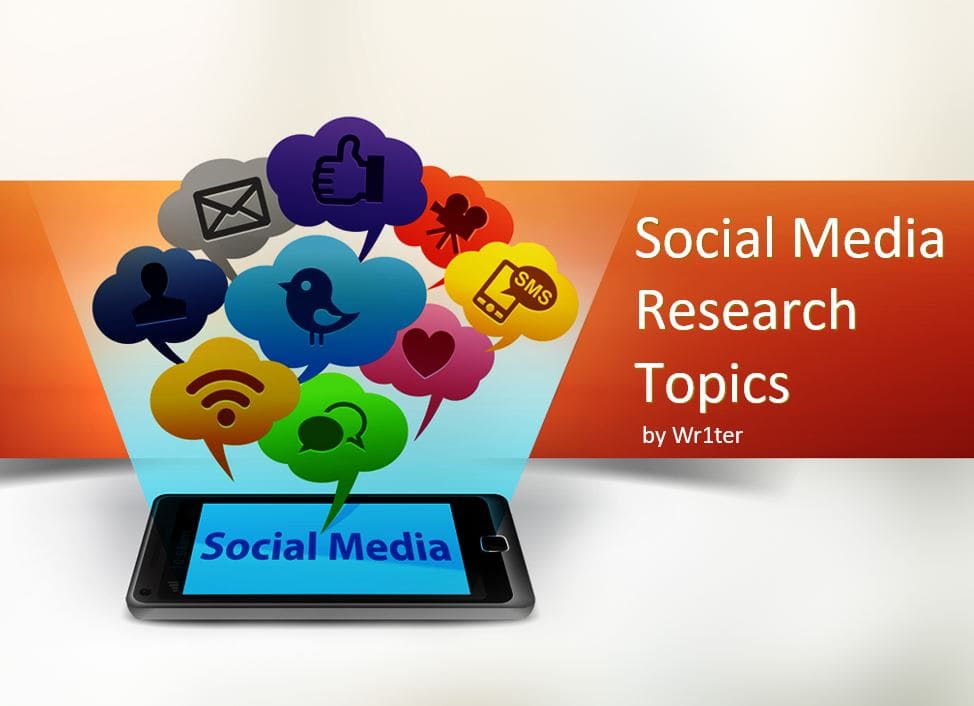
Interesting Social Media Research Topics
- Evaluating the Effects of Social Media on Language and Communication
- Roles of Social Media in Fostering Political Engagement
- Misinformation and Propaganda Spread Through Social Platforms
- Analyzing the Shift From Traditional Media to Social Media
- Dark Patterns in Social Media: Hidden Manipulative Tactics
- Social Media and Digital Activism: Revolutionizing Advocacy
- Augmented Reality (AR) and Its Impact on Social Networking
- Exploring Cybersecurity Issues in Social Media Platforms
- Roles and Effects of Social Media and News in Mental Health Promotion
- Strategies for Effective Social Media Crisis Management
- The Power of Live Streaming for Brands and Influencers
- Using Social Media to Enhance Classroom Learning
- Analyzing the Influence of Memes on Internet Culture
- Impacts of Social Media Algorithms on User Behavior
- Assessing the Correlation Between Social Media and Loneliness
- Geotagging and Its Implications for Personal Privacy
- Social Media and E-commerce: A Cross-Industry Study
- The Ethics of Digital Advertising on Social Platforms
- Understanding the Psychology of Social Media Trolls
- The Cultural Shift Caused by Social Media Localization
Social Media Research Paper Topics for High School
- The Phenomenon of Cyberbullying: Prevention and Strategies
- How Does Social Media Influence Teen Body Image?
- Evaluating the Educational Potential of Social Media Platforms
- Impacts of Social Media on Adolescents’ Self-Esteem
- Roles of Free Connection and Social Media in Modern Political Activism
- Exploring the Concept of ‘Digital Citizenship’ Among Teenagers
- The Ethics of Social Media Privacy: User Rights and Responsibilities
- Social Media Addiction: Understanding Its Causes and Effects
- Influence of Social Media on Modern Communication Styles
- Analyzing Positive Roles of Social Media in Promoting Reading Culture
- Social Media and Mental Health: Correlation or Causation?
- The Role of Social Media in Global Environmental Awareness
- Examining Social Media’s Impact on Real-Life Social Skills
- Social Media Platforms: Tools for Personal Branding or Narcissism?
- Influence of Social Media Trends on Youth Fashion Choices
- Impacts of Social Media on Teenagers’ Sleep Patterns
- Online Safety: The Role of Parents and Schools in Social Media Usage
- How Does Social Media Influence Teenagers’ Views on Relationships?
- Social Media and Empathy: Does Online Interaction Decrease Compassion?
Social Media Research Paper Topics for College Students
- Evaluating the Impact of Social Media on Body Image and Self-Esteem
- The Influence of Social Media on Voting Patterns Among Young Adults
- Social Media as a Valid Tool for Social Change: A Case Study Approach
- Unveiling the Psychology of Social Media Addiction
- Social Media’s Role in Modern Journalism: Opportunities and Challenges
- Privacy Implications of Data Collection on Social Media Platforms
- Cyberbullying in the Age of Social Media: Scope and Solutions
- The Ethical Aspects of Social Media Influencer Marketing
- Roles and Effects of Social Media in Crisis Communication and Management
- Social Media and Its Effects on Interpersonal Communication Skills
- Analyzing Social Media Strategies of Successful Businesses
- Impacts of Internet Use and Social Media on Mental Health Among College Students
- The Roles That Social Media Has in Modern Political Campaigns
- Understanding the Social Media Algorithm: Bias and Implications
- Social Media and Consumer Behavior: The Power of Influencer Marketing
- Fake News, Authors, and Disinformation Spread Through Social Media Platforms
- Exploring Direct Links Between Social Media Use and Academic Performance
- Social Media’s Role in Promoting Sustainable Lifestyle Choices
- Regulation of Hate Speech and Offensive Content on Social Media
- The Power and Peril of Virality in the Age of Social Media
Social Media Research Paper Topics for University
- The Effect That Social Media Has on Global Politics
- The Ethics of Data Mining in Social Media
- Roles of Social Media in Business Marketing Strategies
- Social Media, Internet Use, and Their Impacts on Mental Health: A Systematic Review
- Algorithmic Bias in Social Media Platforms: Causes and Consequences
- The Influence of Colors and Social Media on Consumer Behavior
- Exploring Possible Relationships Between Social Media Use and Academic Performance
- Privacy, Morality, and Security Concerns in the Age of Social Media
- Social Media as a Platform for Digital Activism
- Impacts of Social Media on Interpersonal Communication and Relationships
- Cyberbullying on Social Media: Scope, Impact, and Preventive Measures
- The Role of Social Media in Spreading Health-Related Misinformation
- Analyzing the Effect of Social Media on Journalism Practices
- Understanding the Influence of Social Media on Body Image Perceptions
- Social Media’s Role in Crisis Management: Case Studies
- The Power and Effectiveness of Influencer Marketing on Social Media
- Fake News and Disinformation in the Social Media Age
- Regulatory Approaches to Hate Speech on Social Media Platforms
- The Economic Implications of Social Media: From Startups to Giants
Social Media Research Paper Topics for Masters
- Advanced Algorithms and Their Role in Shaping Social Media Interactions
- Evaluating the Impact of Social Media on Democratic Processes Globally
- The Intersection of Privacy, Data Mining, and Ethics in Social Media
- Quantitative Analysis of Social Media’s Impact on Consumer Buying Behavior
- Cybersecurity Threats in Social Media: Mitigation and Prevention Strategies
- Analyzing the Psychological Implications of Social Media Addiction
- Using Social Media Data to Predict Market Trends: An Econometric Approach
- Role of Social Media in Crisis Management: A Comparative Study
- The Sociolinguistic Impact of Social Media on Communication
- Machine Learning and AI in Social Media: An Examination of Emerging Trends
- Social Media as a Valid Tool for Public Health: Opportunities and Challenges
- Social Media’s Influence on Modern Journalism: A Critical Analysis
- Mapping Social Networks: A Graph Theory Approach
- Evaluating the Efficacy of Social Media Campaigns in Social Change Movements
- Analyzing the Role of Social Media in Corporate Reputation Management
- Data Privacy Laws and Social Media: A Comparative Study
- The Use of Small and Big Data Analytics in Social Media Marketing
- Social Media and Its Role in Strengthening Democracy: A Deep Dive
- The Impact of Social Media on Cultural Assimilation and Identity
- Ethics of Artificial Intelligence in Social Media Content Moderation
Social Media Research Paper Topics for Ph.D.
- Analyzing the Impact of Social Media Algorithms on User Behavior and Perceptions
- Deciphering the Influence of Social Media on Political Campaign Strategies
- Examining the Role of Social Media in Corporate Social Responsibility Initiatives
- Social Media and Mental Health: A Comprehensive Analysis of Recent Studies
- Effects of Social Media and Internet Use on Consumer Buying Behavior: An Econometric Approach
- Social Media and Digital Diplomacy: A Critical Analysis
- Ethical Implications of Data Mining Techniques in Social Media Platforms
- Unpacking the Psychological Mechanisms of Social Media Addiction
- Role of Social Media in Contemporary Journalism: Opportunities and Challenges
- Social Media and Privacy: A Comparative Study of Data Protection Laws
- Machine Learning and AI in Social Media: Identifying Future Trends
- Social Media’s Possible Influence on People, Body Image, and Self-Esteem: A Meta-Analysis
- Analyzing the Role of Social Media in Crisis Management and Communication
- Impacts of Social Media on Different Language and Communication Styles
- Cybersecurity in Social Media: An Analysis of Current Threats and Mitigation Strategies
- Social Media as a Good Tool for Health Promotion and Disease Prevention
- Effects of Social Media on Children and Their Parents: Social Skills and Interpersonal Relationships
- Roles of Social Media in Promoting Gender Equality and Women’s Rights
- Social Media and its Influence on Cultural Assimilation and Identity Formation
Social Media Research Topics for Argumentative Papers
- Impacts of Social Media on Social and Political Discourses: Enhancing or Hindering Democratic Engagement?
- Social Media and Mental Health: Exploring the Association Between Excessive Usage and Psychological Well-Being
- Fostering Online Activism and Social Movements: The Role of Social Media
- Balancing Personal Information Sharing and Data Protection: Social Media and Privacy
- Exploring the Effects of Social Media on Body Image and Self-Esteem
- Social Media and Political Polarization: Reinforcing Echo Chambers or Encouraging Diverse Perspectives?
- Youth Culture and Identity Formation: The Influence of Social Media
- Fake News and Misinformation: Combating Inaccurate Information in the Era of Social Media
- Social Media and Cyberbullying: Examining the Impact on Mental Health and Well-Being
- The Ethics of Social Media Research: Privacy, Informed Consent, and Ethical Considerations
- Relationships in the Digital Age: Exploring the Influence of Social Media Use
- The Influence of Internet, Technology, and Social Media on Consumer Behavior and Buying Decisions
- Analyzing the Role of Online Platforms in Elections: Social Media and Political Campaigns
- Social Media in Education: Exploring the Benefits and Challenges of Integration in the Classroom
- Impacts of Social Media and Interface on News Consumption and Journalism Practices
- Body Politics in the Digital Space: Examining Representations of Gender, Race, and Body Image on Social Media
- Addressing Ethical and Security Concerns in the Digital Age: Social Media and Cybersecurity
- Shaping Consumer Behavior and Brand Perception: The Role of Social Media Influencers
- Civic Engagement in the Digital Era: Assessing the Role of Social Media Platforms
- The Influence of Social Media Algorithms on Information Consumption and Personalization
Social Media Research Topics for Persuasive Papers
- The Power of Social Media in Driving Social and Political Change
- Promoting Digital Literacy: Empowering Users to Navigate the Complexities of Social Media
- Social Media as a Catalyst for Social Justice Movements: Amplifying Marginalized Voices
- Countering Fake News and Misinformation on Social Media: Strategies for Critical Thinking
- Harnessing the Influence of Social Media for Environmental Activism and Sustainability
- The Dark Side of Social Media: Addressing Online Harassment and Cyberbullying
- Influencer Marketing: Ethical Considerations and Consumer Protection in the Digital Age
- Leveraging Social Media for Public Health Campaigns: Increasing Awareness and Behavioral Change
- Social Media and Mental Health: Promoting Well-Being in a Hyperconnected World
- Navigating the Privacy Paradox: Balancing Convenience and Personal Data Protection on Social Media
- Roles of Social Media and Internet in Fostering Civic Engagement and Democratic Participation
- Promoting Positive Body Image on Social Media: Redefining Beauty Standards and Empowering Individuals
- Enhancing Online Safety: Developing Policies and Regulations for Social Media Platforms
- Social Media and the Spread of Disinformation: Combating the Infodemic
- Roles of Social Media and Technology in Building and Sustaining Relationships: Connecting in a Digital Era
- Influencer Culture and Materialism: Examining the Impact on Consumer Behavior
- Social Media and Education: Maximizing Learning Opportunities and Bridging the Digital Divide
- The Power of Viral Hashtags: Exploring Social Movements and Online Activism
- Social Media and Political Polarization: Bridging Divides and Encouraging Constructive Dialogue
Social Media Topics for Pros and Cons Research Papers
- Examining the Social Effects of Digital Connectivity: Pros and Cons of Using Social Media
- Balancing Privacy Concerns in the Digital Age: Evaluating the Cons and Risks of Social Media Use
- Information Sharing in the Digital Era: Uncovering the Advantages of Social Media Platforms
- Building Online Communities: Analyzing the Strengths and Weaknesses of Social Media Interaction
- Navigating Political Discourse in the Digital Age: The Disadvantages of Social Media Engagement
- Mental Health in the Digital Sphere: Understanding the Benefits and Drawbacks of Social Media
- Combating Cyberbullying: Addressing the Negative Side of Online Social Interactions
- Personal Branding in the Digital Landscape: Empowerment vs. Self-Objectification on Social Media
- Establishing Meaningful Connections: Exploring the Pros and Cons of Social Media Relationships
- Leveraging the Educational Potential of Digital Platforms: Examining the Benefits of Social Media in Learning
- Body Image and Self-Esteem in the Age of Social Media: Weighing the Positives and Negatives
- From Digital Activism to Political Change: Assessing the Opportunities and Limitations of Social Media
- Unraveling the Influence: Social Media and Consumer Behavior in the Digital Marketplace
- Misinformation in the Digital Landscape: The Pros and Cons of Social Media in the Spread of Disinformation
- Crisis Communication in the Digital Age: Navigating the Benefits and Challenges of Social Media
- Tackling Fake News: Navigating Misinformation in the Era of Social Media
- Maximizing Business Opportunities: Evaluating the Advantages and Disadvantages of Social Media Marketing
- The Psychology of Social Media: Analyzing the Upsides and Downsides of Digital Engagement
- Exploring the Impact of Social Media on Socialization: Benefits, Drawbacks, and Implications
- Online Activism: The Power and Limitations of Social Media Movements
Social Media Topics for Cause and Effect Research Papers
- Enhancing Political Activism: Exploring the Relationship Between Social Media and Civic Engagement
- The Psychological Effects of Digital Connectivity: Investigating the Relationship Between Mental Health of People and Social Media Use
- Political Polarization in the Online Sphere: Understanding the Impact of Digital Networks
- Disrupted Sleep Patterns in the Digital Era: Exploring the Role of Online Platforms
- Digital Distractions and Academic Performance: Analyzing the Effects of Online Engagement
- Navigating Online Relationships: Understanding the Impacts of Digital Interactions
- The Digital Marketplace: Exploring Consumer Behavior in the Age of Online Platforms
- The Loneliness Epidemic: Investigating the Relationship Between Social Media Use and Social Isolation
- Redefining Political Participation: The Influence of Digital Networks on Democracy
- Unmasking Digital Identities: The Psychological Effects of Social Media Use
- News Consumption in the Digital Era: Exploring the Impacts of Online Platforms
- Cyberbullying in the Virtual World: Analyzing the Effects of Online Interactions
- The Digital Campaign Trail: Investigating the Influence of Online Platforms on Voter Behavior
- Fear of Missing Out (FOMO) in the Digital Age: Exploring the Psychological Consequences
- Body Dissatisfaction in the Digital Sphere: Understanding the Impacts of Online Presence
- Information Overload: Coping With the Digital Deluge in the Information Age
- Privacy Concerns in the Online Landscape: Analyzing the Implications of Digital Footprints
- Unveiling the Dark Side: Exploring the Relationship Between Online Activities and Substance Abuse
- Bridging the Political Divide: The Impact of Digital Networks on Sociopolitical Polarization
To Learn More, Read Relevant Articles

431 Music Essay Topics & Ideas
- Icon Calendar 24 May 2023
- Icon Page 4272 words

Essay on My Escape From North Korea
- Icon Calendar 25 April 2023
- Icon Page 713 words
13 social media research topics to explore in 2024
Last updated
15 January 2024
Reviewed by
Miroslav Damyanov
Short on time? Get an AI generated summary of this article instead
To help you choose a specific area to examine, here are some of the top social media research topics that are relevant in 2024.
- What makes a strong social media research topic?
Consider the factors below to ensure your topic is strong and compelling:
Clarity: regardless of the topic you investigate, clarity is essential. It ensures readers will be able to understand your work and any wider learnings. Your argument should be clear and your language unambiguous.
Trend relevancy: you need to know what’s currently happening in social media to draw relevant conclusions. Before choosing a topic, consider current popular platforms, trending content, and current use cases to ensure you understand social media as it is today.
New insights: if your research is to be new, innovative, and helpful for the wider population, it should cover areas that haven’t been studied before. Look into what’s already been thoroughly researched to help you uncover knowledge gaps that could be good focus areas.
- Tips for choosing social media research topics
When considering social media research questions, it’s also important to consider whether you’re the right person to conduct that area of study. Your skills, interests, and time allocated will all impact your suitability.
Consider your skillset: your specific expertise is highly valuable when conducting research. Choosing a topic that aligns with your skills will help ensure you can add a thorough analysis and your own learnings.
Align with your interests: if you’re deeply interested in a topic, you’re much more likely to enjoy the process and dedicate the time it needs for a thorough analysis.
Consider your resources: the time you have available to complete the research, your allocated funds, and access to resources should all impact the research topic you choose.
- 13 social media research paper topics
To help you choose the right area of research, we’ve rounded up some of the most compelling topics within the sector. These ideas may also help you come up with your own.
1. The influence of social media on mental health
It’s well-documented that social media can impact mental health. For example, a significant amount of research has highlighted the link between social media and conditions like anxiety, depression, and stress—but there’s still more to uncover in this area.
There are high rates of mental illness worldwide, so there’s continual interest in ways to understand and mitigate it. Studies could focus on the following areas:
The reasons why social media can impact mental health
How social media can impact specific mental health conditions (you might also look at different age groups here)
How to reduce social media’s impact on mental health
2. The effects of social media exposure on child development
There are many unknowns with social media. More research is needed to understand how it impacts children. As such, this is a very valuable research area.
You might explore the following topics:
How social media impacts children at different ages
The long-term effects of childhood social media use
The benefits of social media use in children
How social media use impacts childhood socialization, communication, and learning
3. The role of social media in political campaigning
Social media’s role in political campaigning is nothing new. The Cambridge Analytica Scandal, for example, involved data from millions of Facebook profiles being sold to a third party for political advertising. Many believe this could have impacted the 2016 US election results. Ultimately, Facebook had to pay a private class-action lawsuit of $725 million.
The role of social media in political campaigns is of global significance. Concerns are still high that social media can play a negative role in elections due to the spread of misinformation, disinformation, and the bandwagon effect.
Research in this area could look into the following topics:
How people are influenced by social media when it comes to voting
Ways to mitigate misinformation
Election interference and how this can be prevented
4. The role of social media in misinformation and disinformation
Misinformation and disinformation mean slightly different things. Misinformation is unintentionally sharing false or inaccurate information, while disinformation is sharing false information with the deliberate intent to mislead people.
Both can play a role not just in elections but throughout social media. This became particularly problematic during the COVID-19 pandemic.
Research into this area is important given the widespread risk that comes with spreading false information about health and safety-related topics.
Here are some potential research areas:
How misinformation and disinformation are spread via social media
The impact of false information (you could focus on how it impacts health, for example)
Strategies for mitigating the impact of false information and encouraging critical thinking
The avenues through which to hold technology companies accountable for spreading misinformation
5. The impact of AI and deepfakes on social media
AI technology is expected to continue expanding in 2024. Some are concerned that this could impact social media. One concern is the potential for the widespread use of deepfake technology—a form of AI that uses deep learning to create fake images.
Fake images can be used to discredit, shame, and control others, so researchers need to deeply understand this area of technology. You might look into the following areas:
The potential impacts of deepfakes on businesses and their reputations
Deepfake identities on social media: privacy concerns and other risks
How deepfake images can be identified, controlled, and prevented
6. How social media can benefit communities
While there’s much research into the potential negative impacts of social media, it can also provide many benefits.
Social media can establish connections for those who might otherwise be isolated in the community. It can facilitate in-person gatherings and connect people who are physically separated, such as relatives who live in different countries. Social media can also provide critical information to communities quickly in the case of emergencies.
Research into the ways social media can provide these key benefits can make interesting topics. You could consider the following:
Which social media platforms offer the most benefits
How to better use social media to lean into these benefits
How new social platforms could connect us in more helpful ways
7. The psychology of social media
Social media psychology explores human behavior in relation to social media. There are a range of topics within social media psychology, including the following:
The influence of social media on social comparison
Addiction and psychological dependence on social media
How social media increases the risk of cyberbullying
How social media use impacts people’s attention spans
Social interactions and the impact on socialization
Persuasion and influence on social media
8. How communication has evolved through social media
Social media has provided endless ways for humans to connect and interact, so the ways we do this have evolved.
Most obviously, social media has provided ways to connect instantaneously via real-time messaging and communicate using multimedia formats, including text, images, emojis, video content, and audio.
This has made communication more accessible and seamless, especially given many people now own smartphones that can connect to social media apps from anywhere.
You might consider researching the following topics:
How social media has changed the way people communicate
The impacts of being continuously connected, both positive and negative
How communication may evolve in the future due to social media
9. Social media platforms as primary news sources
As social media use has become more widespread, many are accessing news information primarily from their newsfeeds. This can be particularly problematic, given that newsfeeds are personalized providing content to people based on their data.
This can cause people to live in echo chambers, where they are constantly targeted with content that aligns with their beliefs. This can cause people to become more entrenched in their way of thinking and more unable or unwilling to see other people’s opinions and points of view.
Research in this area could consider the following:
The challenges that arise from using social media platforms as a primary news source
The pros and cons of social media: does it encourage “soloization” or diverse perspectives?
How to prevent social media echo chambers from occurring
The impact of social media echo chambers on journalistic integrity
10. How social media is impacting modern journalism
News platforms typically rely on an advertising model where more clicks and views increase revenue. Since sensationalist stories can attract more clicks and shares on social media, modern journalism is evolving.
Journalists are often rewarded for writing clickbait headlines and content that’s more emotionally triggering (and therefore shareable).
Your research could cover the following areas:
How journalism is evolving due to social media
How to mitigate social media’s impact on neutral reporting
The importance of journalistic standards in the age of social media
11. The impact of social media on traditional advertising
Digital advertising is growing in popularity. Worldwide, ad spending on social media was expected to reach $207.1 billion in 2023 . Experts estimate that ad spending on mobile alone will reach $255.8 billion by 2028 . This move continues to impact traditional advertising, which takes place via channels like print, TV, and radio.
Most organizations consider their social strategy a critical aspect of their advertising program. Many exclusively advertise on social media—especially those with limited budgets.
Here are some interesting research topics in this area
The impact of different advertising methods
Which social media advertising channels provide the highest return on investment (ROI)
The societal impacts of social media advertising
12. Impacts of social media presence on corporate image
Social media presence can provide companies with an opportunity to be visible and increase brand awareness . Social media also provides a key way to interact with customers.
More and more customers now expect businesses to be online. Research shows that 63% of customers expect companies to offer customer service via their social media channels, while a whopping 90% have connected with a brand or business through social media.
Research in this area could focus on the following topics:
The advantages and disadvantages of social media marketing for businesses
How social media can impact a business’s corporate image
How social media can boost customer experience and loyalty
13. How social media impacts data privacy
Using social media platforms is free for the most part, but users have to provide their personal data for the privilege. This means data collection , tracking, the potential for third parties to access that data, psychological profiling, geolocation, and tracking are all potential risks for users.
Data security and privacy are of increasing interest globally. Research within this area will likely be in high demand in 2024.
Here are some of the research topics you might want to consider in this area:
Common privacy concerns with social media use
Why is social media privacy important?
What can individuals do to protect their data when using social media?
- The importance of social media research
As social media use continues to expand in the US and around the world, there’s continual interest in research on the topic. The research you conduct could positively impact many groups of people.
Topics can cover a broad range of areas. You might look at how social media can harm or benefit people, how social media can impact journalism, how platforms can impact young people, or the data privacy risks involved with social media use. The options are endless, and new research topics will present themselves as technology evolves.
Should you be using a customer insights hub?
Do you want to discover previous research faster?
Do you share your research findings with others?
Do you analyze research data?
Start for free today, add your research, and get to key insights faster
Editor’s picks
Last updated: 18 April 2023
Last updated: 27 February 2023
Last updated: 6 February 2023
Last updated: 6 October 2023
Last updated: 5 February 2023
Last updated: 16 April 2023
Last updated: 7 March 2023
Last updated: 9 March 2023
Last updated: 12 December 2023
Last updated: 11 March 2024
Last updated: 6 March 2024
Last updated: 5 March 2024
Last updated: 13 May 2024
Latest articles
Related topics, .css-je19u9{-webkit-align-items:flex-end;-webkit-box-align:flex-end;-ms-flex-align:flex-end;align-items:flex-end;display:-webkit-box;display:-webkit-flex;display:-ms-flexbox;display:flex;-webkit-flex-direction:row;-ms-flex-direction:row;flex-direction:row;-webkit-box-flex-wrap:wrap;-webkit-flex-wrap:wrap;-ms-flex-wrap:wrap;flex-wrap:wrap;-webkit-box-pack:center;-ms-flex-pack:center;-webkit-justify-content:center;justify-content:center;row-gap:0;text-align:center;max-width:671px;}@media (max-width: 1079px){.css-je19u9{max-width:400px;}.css-je19u9>span{white-space:pre;}}@media (max-width: 799px){.css-je19u9{max-width:400px;}.css-je19u9>span{white-space:pre;}} decide what to .css-1kiodld{max-height:56px;display:-webkit-box;display:-webkit-flex;display:-ms-flexbox;display:flex;-webkit-align-items:center;-webkit-box-align:center;-ms-flex-align:center;align-items:center;}@media (max-width: 1079px){.css-1kiodld{display:none;}} build next, decide what to build next.

Users report unexpectedly high data usage, especially during streaming sessions.

Users find it hard to navigate from the home page to relevant playlists in the app.

It would be great to have a sleep timer feature, especially for bedtime listening.

I need better filters to find the songs or artists I’m looking for.
Log in or sign up
Get started for free

- Services Paper editing services Paper proofreading Business papers Philosophy papers Write my paper Term papers for sale Term paper help Academic term papers Buy research papers College writing services Paper writing help Student papers Original term papers Research paper help Nursing papers for sale Psychology papers Economics papers Medical papers Blog

193 Great Social Media Research Topics For Successful Paper
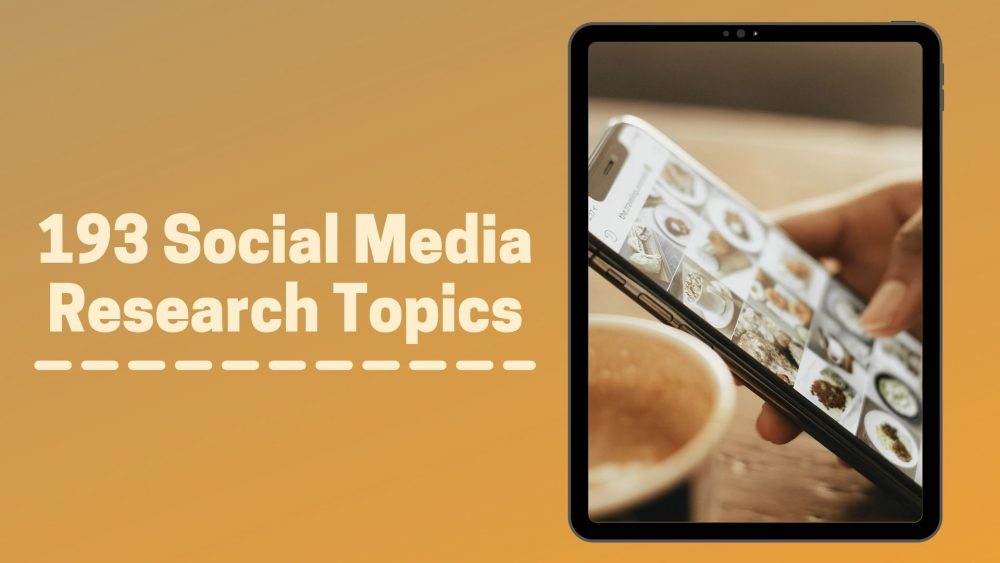
Social media sites are those that facilitate the sharing of ideas, thoughts, and information through virtual networks or communities. Social media is internet-based and gives users effective electronic communication of content. On social media sites, you can send messages, images, documents, videos, or other forms of data. The various large social media networks include; Facebook, YouTube, TikTok, Instagram, Snapchat, and Twitter.
Characteristics of a Good Social Media Research Paper
To write a good social media research paper, follow this procedure:
- Check The Instructions: Check the instructions on what is required. You also need to consult the professor to know what is expected. This will help you to choose the right topic that will lead to a proper research paper. You can check whether the essay needs to be persuasive, engaging, or argumentative.
- Choose A Topic: Choose a topic that is not too complex. Additionally, it should be something that you are passionate about. Browse various sample papers online to know the best topic to use.
- Research Well: Once you choose a topic and seek approval from your professor, you now need to do proper research. You can use scholarly articles, documentaries, films, and other data to find the relevant needed information.
- Draft It Out: Write out the key points and know how the introduction body and conclusion will be. If doing a project, thesis, or dissertation, write a great abstract. The draft should contain all the relevant information. Remember to write titles that correspond to the main points.
- Write The Final Paper: Once you are done, write the final paper and proofread to ensure that everything you’ve written is as it should be.
Social Media Research Topics
Social media is a great place to interact with friends, colleagues, family, bloggers, and even celebrities. They make the world seem a bit smaller with the amount of information you can get from it.
- The factors that lead to the growth of social media sites.
- Evaluate how social media fuels rebellion among teenagers.
- How are social network websites used for political affairs?
- The best ways to deal with children’s addiction in social sites.
- How can social media sites be used during certain country disasters?
- Evaluate how data protection is done on social media sites.
- In your own opinion, do you think there should be an age restriction on the use of social networks?
- Evaluate the various reasons that companies are opting to advertise more on Facebook.
- The major factors that lead to the popularity of social media sites like Instagram.
- Evaluate the growth of social media in the past 10 years – what has changed?
- Is there a relationship between social media and mental problems?
- Discuss how the major changes that have occurred in communication are due to social media sites.
- Evaluate the evolution of Twitter from its inception to date.
- The best tactics to build a strong social media presence.
Social Media Research Questions
Did you know that social media sites can play with the psychology of a teen? They will see society differently than they were used to.
- Which are the best ways to monitor children’s access to social media platforms?
- Among all the social media platforms, which is the best to use when starting a business?
- Which are the positive and negative effects of using social media sites?
- How do social networks make people commit suicide?
- Which are the negative effects of children using social media sites?
- How can addiction to social media occur? The best methods to use to curb it.
- Which are the advantages and disadvantages of parents monitoring their children’s social media presence?
- How do social media networks help whenever there is a disaster?
- How effective is Twitter when providing some information globally?
- Do you think that social media connects and disconnects people equally?
- How do social media networks facilitate kidnapping and assaults?
- How effective is the social media network when providing good PR?
- How effective is data protection on the internet?
- Is it safe to do a job on any of the social media platforms?
Research Papers On Social Media
Have you ever come across a social media political campaign? Well, yes, there are social media politics. A couple of politicians have gained popularity through social media exposure.
- Evaluate the changes that have occurred in human values after social media prevalence.
- Should there be a restriction on social media activities for both adults and children?
- Does social media enhance or prevent stereotyping?
- The best way to recognize valid advertisements and spam.
- The best way social media can help to stop racism.
- The effects of online games.
- The negative effects of social media on crime cases.
- The best way to manage social media pressure among celebrities globally.
- How do social media sites boost personal branding?
- The positive effects of social media on improving the corporate image.
- How does influence marketing help in boosting businesses?
- The influence of chatbots in boosting communication in companies.
- The best strategies to use to create a strong online presence.
- Evaluate the evolution of social media.
Interesting Social Media Research Topic
There is a close relationship between social media and relationships. This is because it plays a major role in how people relate. This is in families, couples, friends, and colleagues.
- The power of online communities.
- The impact of business branding in increasing sales.
- The major roles of images in boosting online communication.
- The best methods to use to monitor kids’ activities on social media.
- Social empowerment on the use of social media sites.
- The impact of social media in boosting spirituality in individuals.
- The major impacts of social media on job creation.
- The effects of cybercrime on different individuals.
- How do social media relationships occur?
- The safety of social media relationships in the modern age.
- The importance of social media in new products marketing.
- How does social media help in marketing?
- The negative and positive impacts of social media in religious missions.
- The role of social media in breaking news to the public.
Social Media Research Papers
Of late many people have been indulging in the social media business. This is because of its diversity. There is a lot of areas that still require exploration in the digital world.
- Evaluate the impact of social media on modern times.
- The effectiveness of government communication through social media.
- How has social media influenced education?
- The impact of social media in journalism.
- The effectiveness of mobile technology in marketing.
- The various regulations put in place for online activities.
- The most effective email marketing strategies.
- How is social media being used to boost food security?
- How does social media affect the behaviors of children at school and home?
- The global regulations on online activities.
- The various online marketing modes used by various social media marketers.
- The best way to use social media networks to boost your content visibility.
- How can startups use social media to boost their customer service experience?
- Do you think information overload influences our health?
More Social Media Research Paper Topics
Narcissism behaviors can also be seen easily on social media sites. These are some of the best social media research papers that you can start with. Therefore, use our research paper writing services to get a professional help with your papers.
- How social media aids in fighting stereotypes?
- Do you think terrorists use social networks to recruit new members?
- Which kind of information should be restricted on social media sites?
- The best way social sites help to attract people’s attention to social problems.
- How do you think social media aids to make us educated?
- Why do you think people use more time using social media sites?
- The negative effects of information overload.
- Do you think social media is the best place to seek justice?
- How does social media stimulate mental issues?
- The effects of using women’s bodies for advertisements globally.
- Do you think social media sites are 100% effective for communication?
- The healthy ways of self-realization through social media.
- The best way to earn from social media sites.
- How can blogging help to boost the education system?
Research Topic On Social Media
These are some of the best media topics. You can also find some multimedia topics that you can use for your research paper. Digital media is interesting and you get a lot of information from it.
- Evaluate business growth in the past and present due to social media networks.
- How does social media help us to find inspiration?
- The amount of time to use when using social media sites.
- Why do you think people always crave likes on social media sites?
- Why do you think people are often aggressive when using social media sites?
- Why do you think cyberbullying is rampant on social media?
- What do you think makes marketing great on social media?
- Has social media influenced what is considered beautiful and what is not?
- The best way to depoliticize is through social media.
- The best ways to interact positively with people through social media.
- Do you think it is effective to find a relationship partner through social media?
- It is recommended for employers to always check the social media accounts of their employees?
- Do you think it is wise to check a candidate’s social media presence before hiring?
- The best way to boost your social media presence as a brand ambassador.
Informative Research Questions On Social Media
Are you looking for good and interesting research questions on social media? Look no further! You can start with these. Also, remember to do thorough research to meet the end goal.
- Which are the lessons gotten from social media network usage?
- The only time when children should be allowed to use social sites.
- The best way to raise funds for sick people using social media.
- The best ways social media can be used for acts of mercy.
- How social media is a new culture.
- Do you think social media makes us accept violence easily?
- How do you think social media sites are used to plan crimes?
- The relation between social media and violence.
- The relation between social media and culture.
- The most popular kinds of posts on social media sites.
- The influence of Instagram on women.
- The best way to find your perfect target audience.
- How are social media sites used to unite human beings?
Best Social Media Paper Ideas
It is important to submit high-quality work to your professor. Try our college paper writing service and discover the benefits of high-quality and cheap paper writing help. This will help you to gain top grades while in college.
- Why do some accounts gain more followers than others?
- How businesses can use social media in client service development?
- The best methods to stop cyberbullying on social media sites.
- Do you think it is recommended to trust bloggers’ views before making a purchase?
- How have social sites become a platform for new business destinies?
- The best methods to use to become a celebrity on media sites.
- Should teachers keep their accounts closed to prevent students from knowing them?
- The various professions emerged due to the developing of social media.
- How to find your perfect social media audience.
- Customer engagement on social media platforms.
- The best way social media can be used is to make students more aware of their surroundings.
- How can social media be used to track a lost person?
- The use of mass media on the development of the education system.
- Why do you think people love reading gossip on various social media sites?
Argumentative Research Topics About Social Media
These research topics about social media will make you think deeper and see the online world differently. Through research, you will also learn why the” future is digital.”
- How do social media sites help in enriching students with presentation skills?
- The best way social media can be used to educate students on real-life scenarios.
- The best way to reduce theft on social media sites.
- The best way to crowdsource different people to achieve something,
- How do social media sites invade people’s privacy?
- Which should be an age limit for using certain social media sites?
- The best way to learn through social media.
- The policies and regulations needed for social media usage.
- The effectiveness of social media sites during elections
- How has social media led to family breakups?
- How easy is it to get information online?
- Evaluate all the Twitter limitations.
- How do people fake it on social media?
- Evaluate how to make the online space safe.
Amazing Social Media Paper Topics
As a student, you need to strive to achieve diligently in your course units. Here are some amazing topics that you can use.
- The amount of bandwidth used when using social media.
- The negative effects of joining social media platforms when too young.
- The network connectivity issues that occur on social sites.
- The best legislations that can be put in place for social media
- The best way to earn through online games.
- The effectiveness of digital dating sites on boosting relationships.
- Data protection policies on social media sites.
- The best way start-ups can use to boost their companies online.
- Do you think social media networks are increasing suicide cases?
- The best way to gain followers on Twitter.
- The various causes of addiction on social media.
- The best way to reduce addiction to social media among the youth.
- The best way to improve social sites for all ages.
- The various ways Twitter has been used to save lives
Engaging Social Networks Topics
Social media emerged as a way to interact with family and friends. However, with time, businesses started to take advantage of the popular new communication method.
- The diverse relation between social sites and religion.
- Is it ethical to monitor your employee’s social networks?
- The various modes being used to improve interaction online.
- Is parent-child protection necessary while online to prevent bullying?
- The dangers of posting pictures online.
- Evaluate how social media is disconnecting people?
- The censorship policies that are being put in place for mass media.
- The mass media bias during elections.
- How does cyberbullying occur online?
- The business of mass media during elections in different regions of the world.
- The various important mass media ethics.
- Evaluate phone journalism
- How are images important when giving a story on social media sites?
- The interrelation between politics and media.
- The history of mass communication
Unique Social Networking Topics
Social media sites have made it easier to get real-time information fast. Additionally, you get to learn about the latest trends and technologies.
- The impact of fake news on modern society.
- How does accreditation of journalists occur online?
- Evaluate the currency of news.
- The advantages and disadvantages of mass communication.
- The relation between mental illnesses and social media
- The relation between media, ethics, and public relation.
- The relation between media, fashion, and aesthetics.
- The positive and negative effects of media cliché.
- How can media be used as an instrument of propaganda?
- The relation between terrorism and media.
- The common major media industries.
- The movement rules and politics about media.
- The relation between reality shows, privacy, and ethics
- How does media get information overloading?
- How are social media sites making us lonely?
Social Media Research Paper Thesis
Social media marketing has grown over time and is slowly gaining popularity. These are some of the best social media research papers that you can use for your thesis.
- The best way to protect children online.
- Evaluate the world-famous influencers on social media.
- The effect of social media on our relationships.
- Evaluate addiction in social media in different age groups.
- How does social media use lead to anxiety?
- The negative and positive effects of social media on the youth.
- The importance of social media presence on recruitment.
- The real value of social media
- The effects of social media on human beings.
Trying To Finish Your Social Media Paper?
Are you looking for someone who can do a research paper for you? Look no further! We will provide the best writing help. We have experts who specialize in different things, with the majority being writers. You can also get the required customer support when you need it. The writers are often available and reliable enough to provide the best work. Your professors will be happy. As students, it is important to give it your best while at school.

Leave a Reply Cancel reply
Your email address will not be published. Required fields are marked *
Save my name, email, and website in this browser for the next time I comment.
Terms & Conditions Loyalty Program Privacy Policy Money-Back Policy
Copyright © 2013-2024 MyPaperDone.com
147 Best Social Media Research Topics To Beat The Trend In 2023
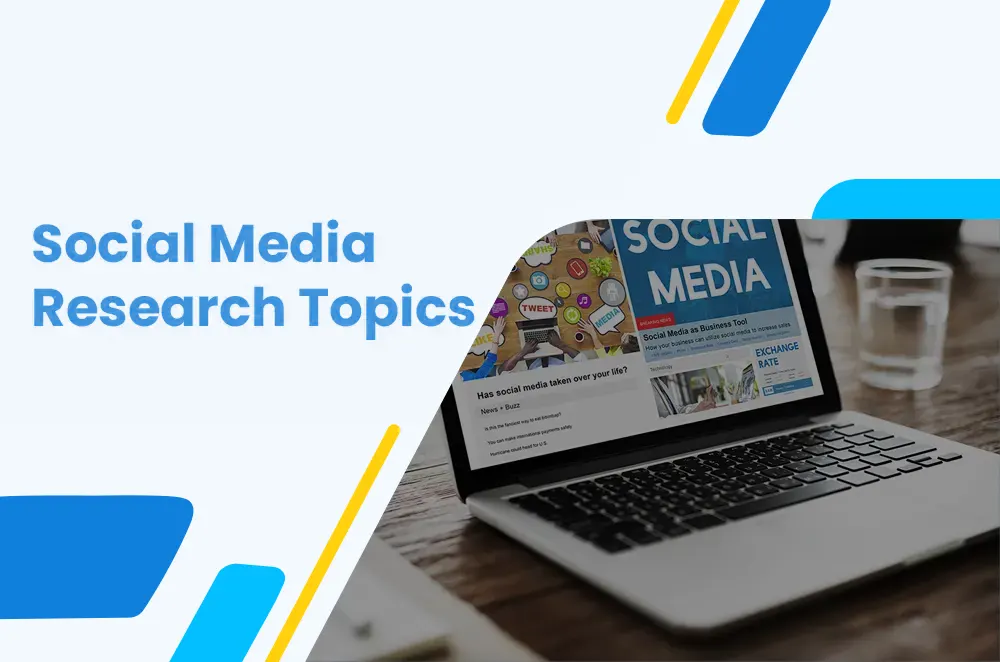
With the advancement of technology, social media has become an essential part of our lives. It provides a platform for people to express themselves and share their thoughts with others. It also allows people to connect on a global scale. Social media has helped to make the world smaller and more connected.
Social Media is essential in many industries today – from marketing, advertising, and public relations to education, healthcare, and even entertainment. Social Media is now so widespread that it has become a necessity for businesses.
As writers who have a lot of knowledge regarding custom writing services would share what we know about social media research topics that can make your day.
Table of Contents
Social Media Research: Related To Trends, Privacy, Psychology and more
We are rooting for you to leave your competition behind in your research. That is why we have 147 of the most engaging social media research topics that work as a muse and introduce you to an uncanny inspiration. Let’s go ahead and discover together!
Trendy Social Media Research Topics
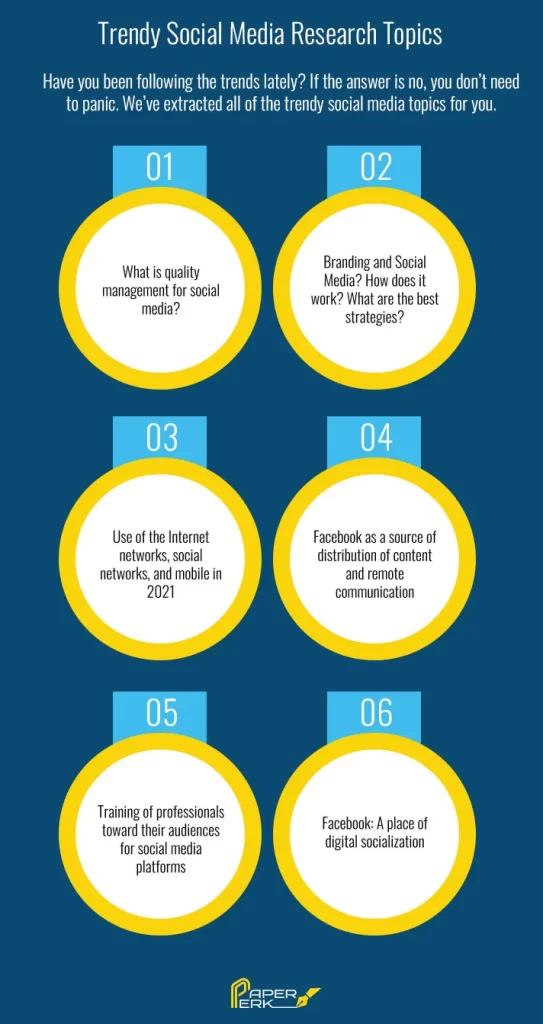
Have you been following the trends lately? If the answer is no, you don’t need to panic. We’ve extracted all of the trendy social media topics for you.
- What is quality management for social media?
- Branding and Social Media? How does it work? What are the best strategies?
- Use of the Internet networks, social networks, and mobile in 2021
- Facebook as a source of distribution of content and remote communication
- Training of professionals toward their audiences for social media platforms
- Facebook: A place of digital socialization among top social media sites
- The place of social networks in journalistic information
- The positive aspects of the Internet and social networks
- Increasing impact and importance of social media networks
- The future of social media: Would Facebook remain a monopoly?
- The negative aspects of social media sites and the internet
- Instagram vs. Facebook: A complete research on features. Which is better?
- The rise in popularity of TikTok
- Role of social media politics in the society
Read More: Accounting Research Topics
Social Media Platforms Research Topics Related Journalism
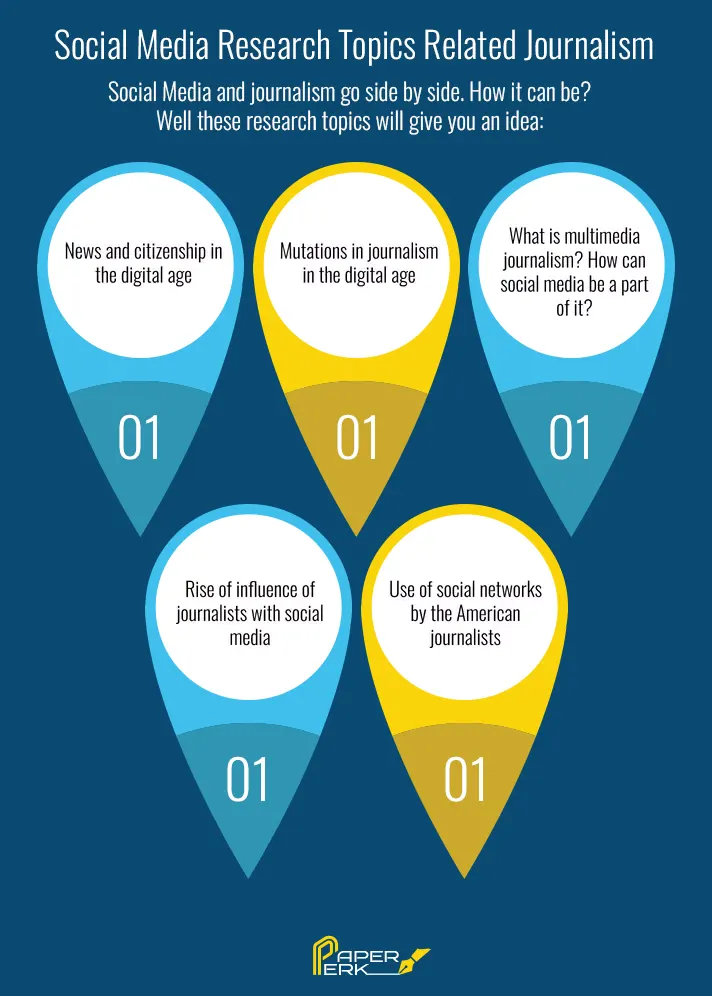
Social media and journalism go side by side. How can it be? Well, these research topics for social media research papers will give you an idea:
- News and citizenship in the digital age
- Mutations in journalism in the digital age
- What is multimedia journalism? How can social media be a part of it?
- Rise of influence of journalists with social media sites
- Do we still need journalists in the time of social media sites?
- What role can social media sites play in overcoming the impact of toxic journalism?
- How to deal with the swarming misinformation on social media?
Read More: Research Paper Topics
Social Media Research Topics For Psychology
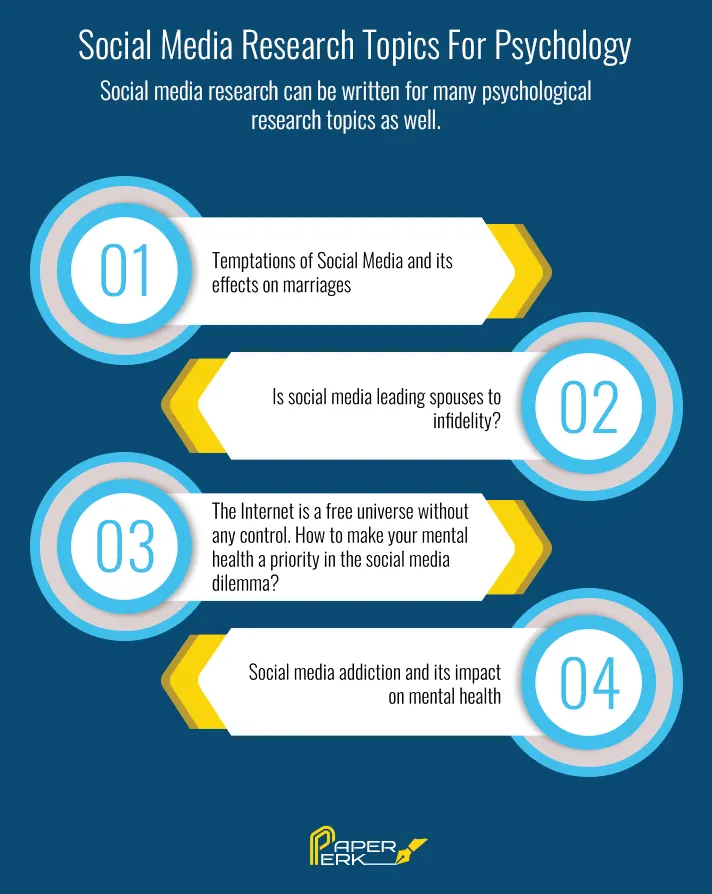
Social media research can be written for many psychological research topics as well.
- Temptations of Social Media and its effects on marriages
- Is social media leading spouses to infidelity?
- The Internet is a free universe without any control. How to make your mental health a priority in the social media dilemma?
- Social media addiction and its impact on mental health
- Has social media increased the cases of mental health problems? Prove write or wrong with analytics and data.
- How Social Media is isolating children from parents and teachers
- The psychology behind social media addiction
- The positive aspects of the Internet and social networks on mental health
- Do you think that the Internet, in general, and social networks pose Psychological risks for an individual?
- How social media is affecting family mental health
- Mental health problems in adolescents caused by Social Media
- Symptoms of anxiety, depression, and loneliness in people who spend 3-6 hours a day on Social Media
- Best and safest social media websites
- The dangers of social media addiction to mental health
- Isolation and radicalization are rising because of Social Media
- How social media is different than mass media?
- Nazi and fascist presence on social media: Campaigns against minority
- The psychology behind online hate speech and bullying
- Can social media lead to lower self-esteem?
Read More: Business Research Topics
Social Behavior And Social Media Research Topics
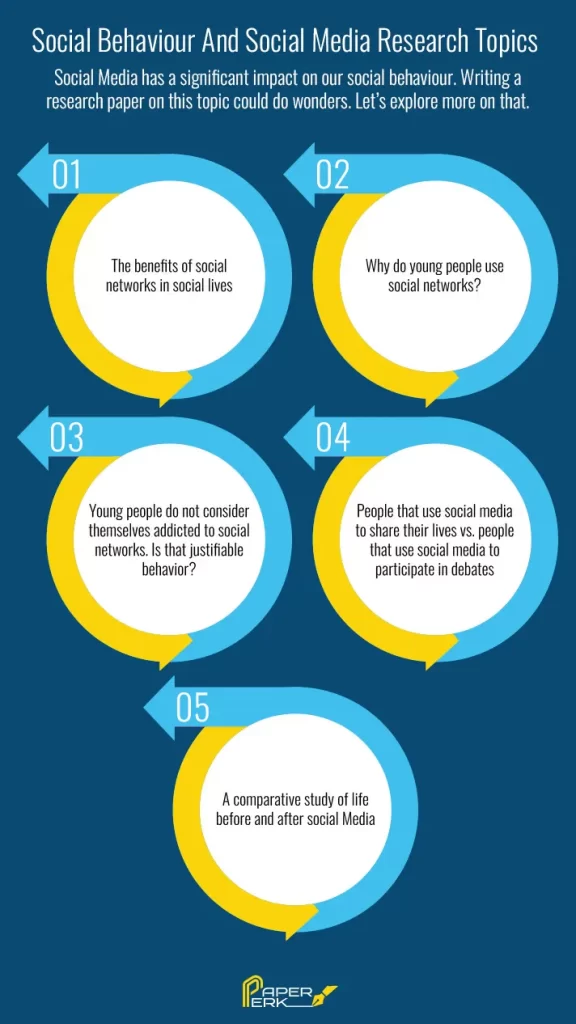
Social media has been a significant impact on our social behavior. Writing a research paper on this topic could do wonders. Let’s explore more on that.
- The benefits of social networks in social lives
- Why do young people use social networks?
- How people’s behavior differs on multiple social media websites
- Behavior of people who have been victims of cyberbullying on social networks
- The social response to cyberbullying and online harassment through social networks
- An examination of the mental health implications of social networks
- What is the impact of Social Media on our happiness?
- As a result of social media, we need more time to concentrate.
- As a result of the extensive use of social media, we experience a decline in the quality of our sleep.
- The adverse effects of Instagram and Snapchat on our self-esteem and self-confidence
- As a result of social media, people are more likely to experience depression, loneliness, and isolation.
- Virtual worlds pose a threat to our brains because of the overload of information they provide
- What are the chances of social networks improving for us in the future?
- Which social networks are trustworthy, and which are untrustworthy?
- How much time do we spend on social media, and is it bad for us?
Read More: Nursing Research Topics
Social Media Research Topics Related To Activism
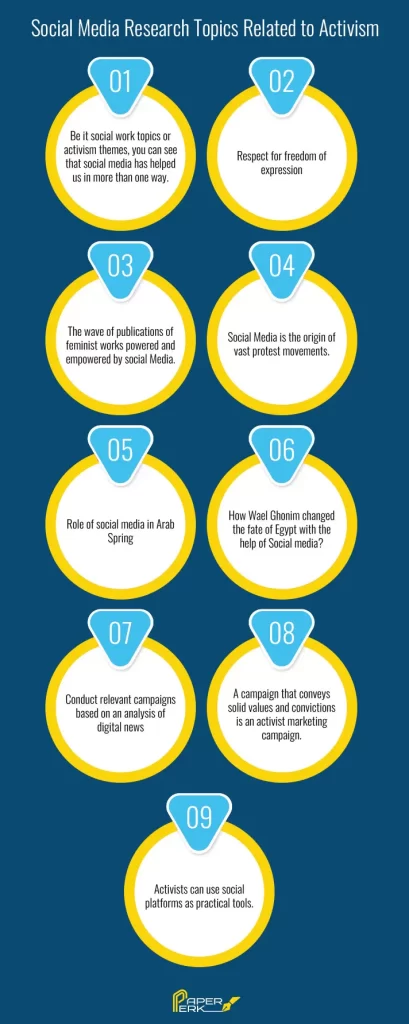
- Be it social work topics or activism themes, you can see that social media papers has helped us in more than one way.
- Respect for freedom of expression
- The wave of publications of feminist works powered and empowered by social Media.
- Social Media is the origin of vast protest movements.
- Role of social media in Arab Spring
- How Wael Ghonim changed the fate of Egypt with the help of Social media?
- Conduct relevant campaigns based on an analysis of digital news
- A campaign that conveys solid values and convictions is an activist marketing campaign.
- Activists can use social platforms as practical tools.
- Increasingly engaged social media users can spread moral messages more widely.
- As fake news becomes more prevalent, activism becomes more critical.
- Youth of Generation Z: more aggressive than ever? In what ways does online aggression originate?
- How social media creates more opportunities for marginalized societies
- Managing a positive social media political campaign
- The most effective way to be a better ally for people of color
- What role does body diversity play outside of fashion?
- Even though sexual racism affects everyone, it is a phenomenon that must be addressed
Read More: Qualitative Research Topics
Social Media Research Topics On Cyber Security and Privacy
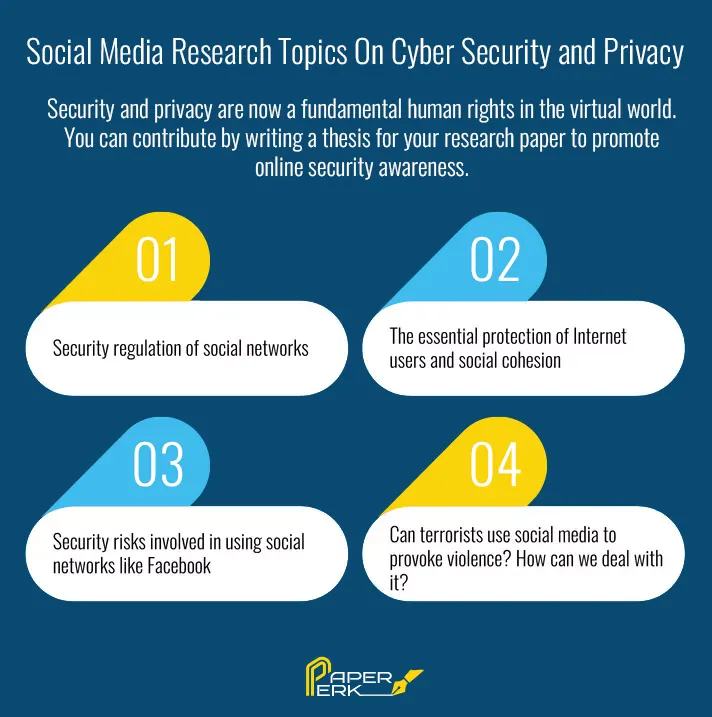
Security and privacy are now a fundamental human rights in the virtual world. You can contribute by writing a thesis for your research paper to promote online security awareness.
- Security regulation of social networks
- The essential protection of Internet users and social cohesion
- Security risks involved in using social networks like Facebook
- Can terrorists use social media to provoke violence? How can we deal with it?
- The morality of social networks, sensitivity, and responsibility
- Bullying and Harassment in social mass media
- How to get over the social media addiction
- How to promote cyber security?
- Professional and private life: How to maintain family safety on Social Media
- How social media poses a threat to family privacy and security
- Barriers between professional and private life diminishing with social networks
- How secure privacy settings on social media are?
- Is social media impenetrable for hackers? The hanging sword of data leaks
- GBWhatsApp Data Leaks: A study on insecure methods leading to harmful privacy dangers
- Cybercrimes on social media: Identity theft
Read More: US History Research Topics
Social Media Criminology Research Papers Topics
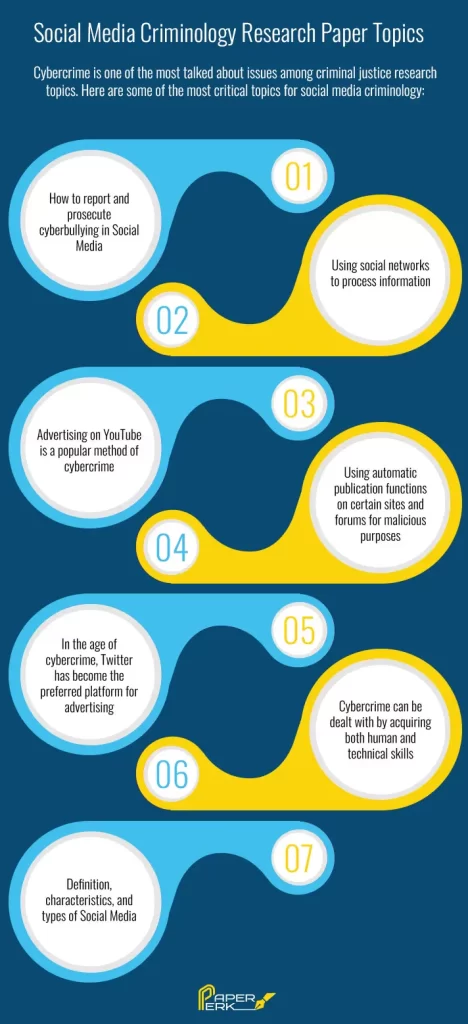
Cybercrime is one of the most talked about issues among criminal justice research topics . Here are some of the most critical topics for social media criminology:
- How to report and prosecute cyberbullying in Social Media
- Using social networks to process information
- Advertising on YouTube is a popular method of cybercrime
- Using automatic publication functions on certain sites and forums for malicious purposes
- In the age of cybercrime, Twitter has become the preferred platform for advertising
- Cybercrime can be dealt with by acquiring both human and technical skills
- Definition, characteristics, and types of Social Media
- The Characteristics, Motivations, and Strategies of Cybercrime from a Criminological Perspective
- What are the forms of cyberbullying on social media and what can be done to prevent it?
- Defamation, the most common cybercrime handled by law enforcement
- Facebook and social media users should be aware of cybercrime and hoax information
- Cases of child prostitution on social media during the lead-up to elections
- Using Social media is dangerous because of hoaxes and low trust
- The use of information technology facilities as a means of committing crime
- Using social media to commit cybercrime is common
- Fraud Committed Through Social Media in Online Shops
- Child pornography and pedophilia: The Darkside of Social Media
- How can we control and put a stop to the rise of cyberbullying against children on social media ?
Read More: High School Research Paper Topics
University Social Media Research Paper Topics
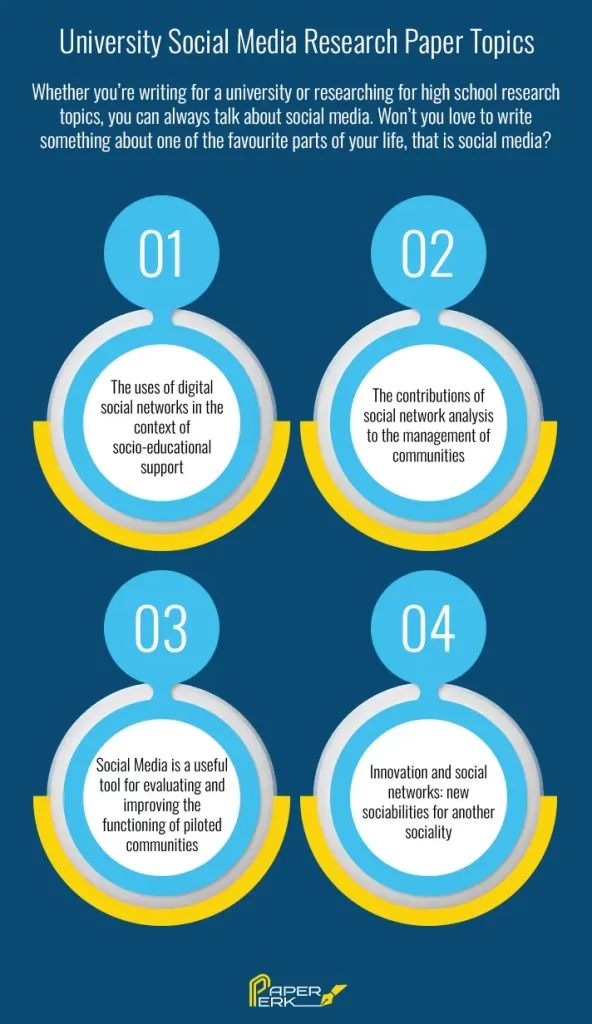
Whether you’re writing for a university or researching for high school research topics, you can always talk about social media. Won’t you love to write something about one of the favorite parts of your life, that is social media?
- The uses of digital social networks in the context of socio-educational support
- The contributions of social network analysis to the management of communities
- Social Media is a useful tool for evaluating and improving the functioning of piloted communities
- How can students deal with social media addiction?
- Innovation and social networks: new sociabilities for another sociality
- Creating a Science of the network through social media: A Case Study
- The social network as a space of hodological individuation
- Learning through social networks. How has social media presence helped adapt to changes after COVID?
- Role of Social Media in the time of the Coronavirus Pandemic
Read More: Political Science Research Topics
Social Media Marketing Research Paper Topics
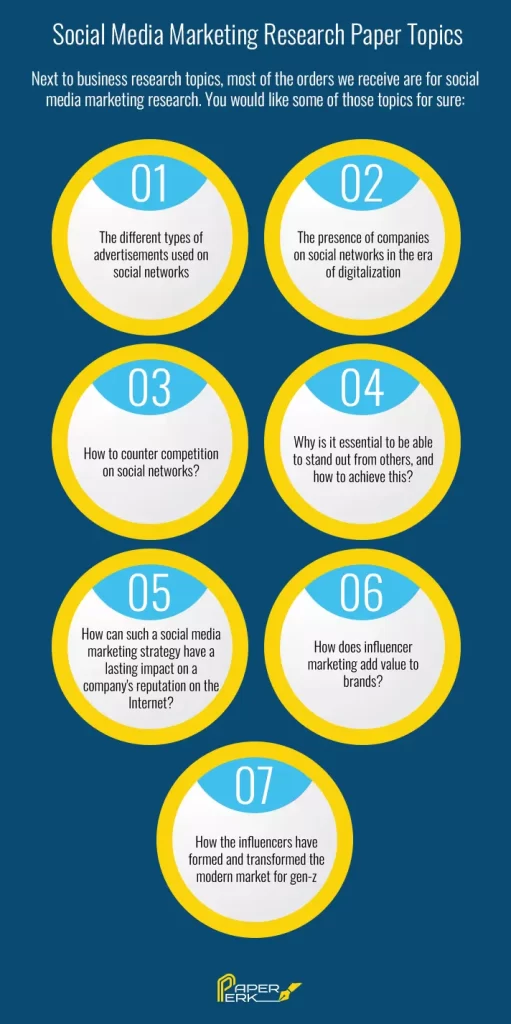
Next to business research topics , most of the orders we receive are for social media marketing research. You would like some of the following examples for sure when writing for a social media research topic:
- The different types of advertisements used on social networks
- The presence of companies on social networks in the era of digitalization
- How to counter competition on social networks?
- How to deal with negative social media effect on your business
- Why is it essential to be able to stand out from others, and how to achieve this?
- How can such a social media marketing strategy have a lasting impact on a company’s reputation on the Internet?
- How does influencer marketing add value to brands?
- How the influencers have formed and transformed the modern market for gen-z entrepreneurs?
- Social media vs. mass media: Pros and cons for each of them
- Building your audience based on tweets, occupation, interests, and location
- How to define and manage audiences when working on social media marketing?
- How can social media insights keep you updated with modern trends?
- How to establish your analytical milestones while working with social media?
- How has Google Trends helped a business into a global transformation? A Case study
- Beating the boundaries with social media platforms. The global business boost on Facebook marketing
- Competition and social networks: how do companies stand out?
- How do companies choose the advertising method that suits them best?
- How has digitization made the use of the internet essential for the success of a company?
Social Media transformed our lives into something amazing. However, everything comes at a price. Regardless, of whatever aspects of social Media you are looking for, we are sure that you will find them in our social media research topics. If you need any further help, you can talk to us through Paper Perk contact page. We can help you with finding your research topics , or any research help that you need.
Order Original Papers & Essays
Your First Custom Paper Sample is on Us!
Timely Deliveries
No Plagiarism & AI
100% Refund
Try Our Free Paper Writing Service
Related blogs.

Connections with Writers and support
Privacy and Confidentiality Guarantee
Average Quality Score
Explore your training options in 10 minutes Get Started
- Graduate Stories
- Partner Spotlights
- Bootcamp Prep
- Bootcamp Admissions
- University Bootcamps
- Coding Tools
- Software Engineering
- Web Development
- Data Science
- Tech Guides
- Tech Resources
- Career Advice
- Online Learning
- Internships
- Apprenticeships
- Tech Salaries
- Associate Degree
- Bachelor's Degree
- Master's Degree
- University Admissions
- Best Schools
- Certifications
- Bootcamp Financing
- Higher Ed Financing
- Scholarships
- Financial Aid
- Best Coding Bootcamps
- Best Online Bootcamps
- Best Web Design Bootcamps
- Best Data Science Bootcamps
- Best Technology Sales Bootcamps
- Best Data Analytics Bootcamps
- Best Cybersecurity Bootcamps
- Best Digital Marketing Bootcamps
- Los Angeles
- San Francisco
- Browse All Locations
- Digital Marketing
- Machine Learning
- See All Subjects
- Bootcamps 101
- Full-Stack Development
- Career Changes
- View all Career Discussions
- Mobile App Development
- Cybersecurity
- Product Management
- UX/UI Design
- What is a Coding Bootcamp?
- Are Coding Bootcamps Worth It?
- How to Choose a Coding Bootcamp
- Best Online Coding Bootcamps and Courses
- Best Free Bootcamps and Coding Training
- Coding Bootcamp vs. Community College
- Coding Bootcamp vs. Self-Learning
- Bootcamps vs. Certifications: Compared
- What Is a Coding Bootcamp Job Guarantee?
- How to Pay for Coding Bootcamp
- Ultimate Guide to Coding Bootcamp Loans
- Best Coding Bootcamp Scholarships and Grants
- Education Stipends for Coding Bootcamps
- Get Your Coding Bootcamp Sponsored by Your Employer
- GI Bill and Coding Bootcamps
- Tech Intevriews
- Our Enterprise Solution
- Connect With Us
- Publication
- Reskill America
- Partner With Us
- Resource Center
- Bachelor’s Degree
- Master’s Degree
The Top 10 Most Interesting Social Media Research Topics
Finding social media research topics you’re interested in is tricky. Social media is a fairly new field, and the constant arrival of new technology means that it’s always evolving. So, students have a lot to think about in their search for topics.
In this article, we’re going to walk you through social media research paper topics that are timely and relevant. We’ll also show you examples of social media research topics you can get inspiration from. Lastly, we’re going to lay out some social media research questions you can ponder while formulating your topic.
Find your bootcamp match
What makes a strong social media research topic.
A strong social media research topic requires clarity of focus. This means that your topic must be timely, relevant, and coherent. This allows your research topic to be compelling and easily understandable to others.
Tips for Choosing a Social Media Research Topic
- Know the trends. Learning what social media topics are trending allows you to know the relevant issues and emergent themes in the field of social media. This also lets you know what topics are well-researched and which ones are still emerging.
- Explore knowledge gaps. Knowing what previous researchers have written prevents you from repeating knowledge that has already been explored and shared. Nobody wants to reinvent the wheel when doing research. Exploring knowledge gaps lets you increase the impact of your work and identify opportunities for further research.
- Choose something that you’re interested in. Diving deep into a topic that you’re interested in motivates you to learn more about it. The research process becomes more engaging when you know you care about your topic.
- Be specific. Knowing what you want to research and what you don’t want to research are keys to the research process. This entails narrowing down your topic to a specific area, subject, theme, or relationship. You want to know the scope and the limitations of your study.
- Check your timeframe. Limiting your topic to a specific timeframe helps in narrowing down what you need to study. For example, you can decide to study a phenomenon that has emerged in just the last three years. By doing this, you’re making sure that your research is both specific and relevant.
What’s the Difference Between a Research Topic and a Research Question?
The difference between a research topic and a research question is in the scope. Research topics tend to be broader than research questions. Research topics focus on a specific area of study within a larger field, while a research question further narrows down what you are researching. A good research question allows you to write on your topic with greater precision.
How to Create Strong Social Media Research Questions
The key to creating strong social media research questions is learning enough about your topic to know where the gaps are. This means that you have to conduct a thorough social media literature review, reading previous studies until you have a handle on what’s been said and what questions are still unanswered. Your question will emerge from this preliminary research.
Top 10 Social Media Research Paper Topics
1. a comparative review of facebook, instagram, and tiktok as primary marketing platforms for small businesses.
A lot of small businesses have flocked to various social media sites to market their products and services. Social networking sites like Facebook, Instagram, and Tiktok are platforms that deliver constant online content to their users. Comparing the marketing and advertising strategies of these online platforms will shed light on how social media helps businesses .
2. The Influence of Social Media on Mental Health
Mental health has been an important topic in social media research these past few years. Social media use and its connection to mental health has even been the subject of systematic reviews. This means that there’s a huge body of previous studies that you can look to when developing your research question.
Exploring both the positive effects and negative impacts of social media sites on mental health helps people and firms establish guidelines that help user communities. This research topic might also cover strategies for helping social media users improve their mental health.
3. The Role of Social Media in Political Campaigning
Social media is a new tool for political campaigning. Exploring what social media strategies have been conducted by politicians running for office helps in determining how social media aids in political campaigning. Studying new strategies like user-generated content for political campaigning allows you to know how voters interact with political candidates.
4. The Role of Social Media in Disinformation
The rise of fake news has coincided with the rise of social networking websites. This topic involves dissecting how social media technologies allow certain types of online content to thrive and make it easier for bad actors to spread disinformation.
5. How Social Media Can Benefit Communities
More and more social issues have been popularized through online content. Diving deep into how social media can facilitate organizational networking lets you compare the traditional and new organizing strategies being created in digital spaces. It also lets you understand how social media activity influences trends in virtual communities.
6. The Effects of Social Media Exposure on Child Development
Children also use social media sites. Some children use social networking sites under the supervision of their parents, and some do not. Social interaction, online or not, affects how children develop. Studying the psychological effects of social media exposure lets you know how social media may improve or derail the growth of children.
7. How Communication Has Evolved Through Social Media
Body language, tone of voice, and other non-verbal cues are absent in online forms of communication. In their place, emojis and other new ways to express thoughts and emotions have appeared. Learning how social media changes the way we talk to one another allows you to develop a theory of communication that takes into account the role of digital communities.
8. Social Media Platforms as Primary News Sources
A lot of people now are getting their daily dose of news and current events through social media. News networks have also established their social media presence on platforms that they can use to deliver news and current events to their audiences. Researching this topic lets you investigate the changes and innovations in information dissemination.
9. How Social Media Paves Way for Non-Traditional Advertising
Regular social media posts, advertisements, and other forms of online content aren’t the only ways businesses market to their audiences. Social media has paved the way for user-generated content and other non-traditional types of online marketing. With this topic, you can learn social media marketing strategies that have been capitalized on the social connection fostered by social networking websites.
10. Impacts of Social Media Presence on Corporate Image
More businesses increasingly build and curate their digital presence through various social networks. Knowing how a business can improve its corporate image through social media influence clarifies the role of technology in modern economics and online marketing.
Other Examples of Social Media Research Topics & Questions
Social media research topics.
- Social Media Addiction and Adolescent Mental Health
- The Rise of Social Media Influencers
- The Role of Social Media Sites as Political Organizing Tools Under Repressive Governments
- Social Media Influencers and Adolescent Mental Health
- How Social Media Is Used in Natural Disasters and Critical Events
Social Media Research Questions
- How was Facebook used as a political campaigning tool in the 2020 United States presidential election?
- What social platforms are the most effective in influencing consumer behavior?
- How does user-generated content boost the credibility of a business?
- How do different types of online content disseminated through popular networks affect the attention span of people?
- What are the most effective forms of online content and social media strategies for increasing sales conversions for small businesses?
Choosing the Right Social Media Research Topic
Choosing the right social media research topic helps you create meaningful contributions to the discipline of social media studies. Knowing the most popular topics in the field can make you an expert on social media. By reading up on previous studies, you will not only be more informed but you will also be in a position to make a positive impact on future studies.
Studying the relationship between social media and different fields produces valuable knowledge. Even if you’re only interested in exploring one social platform or a single social media event or phenomenon, your research can help people better understand how social media engagement changes the face of social relationships in the world at large.
Social Media Research Topics FAQ
Social media is a computer-based technology that allows digital communities to exchange information through user networks. Various social media networks specialize in text, photo, or video transfer. All of these are ways for people on the Internet to share information and ideas with each other.
Social media research is important because it helps you contribute to the growing body of knowledge about digital social settings. In 2021, according to DataReportal, at least 4.88 billion people around the world use the Internet . The more that people connect with each other through the social media domain, the more their quality of life changes, for better or worse.
According to Statista, the most popular social media platforms right now are Facebook, YouTube, and WhatsApp , each of which has at least two billion users. These social networks allow users to share text, picture, and video content with one another.
People use social media to connect with each other, share information, and entertain themselves. Social media sites can broadly serve all of these purposes or be focused on just one of these functions.
About us: Career Karma is a platform designed to help job seekers find, research, and connect with job training programs to advance their careers. Learn about the CK publication .
What's Next?
Get matched with top bootcamps
Ask a question to our community, take our careers quiz.

Leave a Reply Cancel reply
Your email address will not be published. Required fields are marked *


- Customer Reviews
- Extended Essays
- IB Internal Assessment
- Theory of Knowledge
- Literature Review
- Dissertations
- Essay Writing
- Research Writing
- Assignment Help
- Capstone Projects
- College Application
- Online Class
Social Media Research Paper Topics: 15+ Ideas to Get You Started
by Antony W
November 26, 2023

Has your professor asked you to write a research paper on social media but hasn’t given you a title to explore? This is your opportunity to choose a research topic that fascinates you.
Social media is a wide field that’s constantly evolving, and, as such, there’s no limit to what you can write. Just remember that you can only choose one topic, and you want to make sure you give title selection the first best shot.
Don’t worry if you have no topic idea surrounding the social media theme. We’ve put together a list of 50+ Social Media research paper topics to make the ideation stage easier for you.
Key Takeaways
- A research paper topic that explores knowledge gaps in social media can earn you top grades. Such an approach allows you identify opportunities for future research.
- You can choose a theme that focuses on the current trends in social media, so you can cover issues that emerge in the field.
- Ensure the topic is interesting enough to cover. It’s easier to write about something you love that something you don’t.
If you already have a topic and you need writing help, you can hire a research writer at Help for Assessment at 15% discount. Our writers focus on in-depth research, custom writing, and timely delivery.
Social Media Research Paper Topics
The following is a list of social media research topic that may be worth investigating:
Political Campaign Topics
If you have logged on to Twitter, Facebook, or LinkedIn lately, it’s likely that you’ve seen and felt the political at atmosphere on these platforms. From media houses posting political issues on social to politicians actively participating on the platforms themselves, we can see a strong link between the government and social platforms.
Here are some interesting topics to cover if you wish to write a research paper in this area:
- What transformations have occurred in political campaigns in the past two decades?
- Is a transition to online voting a possibility in the near future?”
- What are the adverse effects of political media campaigns?
- Exploring the link between media campaigns and the propagation of stereotypes
- Analyzing PR missteps in the promotion of political media campaigns
- Effectiveness of online PR strategies during political campaigns
- The pivotal role of social networks in shaping political landscapes
- Examining political marketing research on politicians’ web platforms
- Public discourse on the American political landscape through Twitter
- Contrasting the impact of politics on social networks versus television
Social Media Topics Related to Mental Health
Spending too much time on social media can affect how we relate with people in real time. Such a phenomenon does have an effect on our social well-being, as well as mental health. Since mental health as it relates to social media is such an important issue, you can’t run out of topic ideas for your research project.
Here are some examples:
- Understanding the influence of social media on mental well-being
- Examining social media addiction to understand why people become hooked
- Analyzing the relationship between loneliness and social networks
- Addressing mental health disorder caused by social media
- Online support communities for individuals with mental illness
- Exploring the association between depression, anxiety, and Instagram/Facebook
- Navigating the disconnection from reality caused by social media
Sociology Research Topics
Social media platforms contribute to the creation and development of the context of the present day culture. In fact, the internet has made it easy to find information about people and their relationships, all thanks to social media.
Here are some research topics to cover in this division:
- Discovering strategies to reach diverse age groups
- Evaluating the efficacy and skepticism surrounding learning networks
- Unraveling the loneliness phenomenon in online networks
- The growing dependency on social networks
- Examining the impact of romantic narratives on relationship expectations
- The feasibility of conducting web-based sample surveys
Social Media Research Topics on Teens
We’re living in strange times when teens want to act and feel like adults. They don’t want their access to social media restricted and they tend to feel somewhat intimidated if parents try to control their exposure to social networks.
The link between social media and teenagers, as well as how it affects parent-children social life are interesting enough to investigate.
Here are some topics worth exploring:
- The impact of social networks on adolescent rebellion
- Online networks and their influence on youth development
- Examining Instagram, TikTok, and social media addiction
- Media’s influence on the moral development of teens
- Pros and cons of early engagement with online networks
- Comparing social networks to academic resources for teenagers
Interesting Topics on Narcissism
Narcissism is a sensitive and equally controversial subject. The excessive interest admiration and interest in oneself has created a social media buzz. Anyone with this kind of virtue is chasing the numbers, and of course, there are psychological effects linked to this.
Undoubtedly, narcissism in relation to social media is such an interesting area to research. So here are some topic ideas to get you started:
- Why do online platforms encourage individuals to seek approval from their followers?
- How does concealing the count of likes impact users on Instagram?
- Nurturing a positive self-image during a digital detox
- Is it possible to succeed as a blogger without narcissism?
- Adolescents on the internet: Balancing narcissism and self-doubt
Get Instant Help Today
Free features.

Need help to complete and ace your essay? Order our writing service.
Get all academic paper features for $65.77 FREE
About the author
Antony W is a professional writer and coach at Help for Assessment. He spends countless hours every day researching and writing great content filled with expert advice on how to write engaging essays, research papers, and assignments.
- Research Paper Guides
- Research Paper Topics
Social Media Research Topics: Best Ideas for You
- Speech Topics
- Basics of Essay Writing
- Essay Topics
- Other Essays
- Main Academic Essays
- Basics of Research Paper Writing
- Miscellaneous
- Chicago/ Turabian
- Data & Statistics
- Methodology
- Admission Writing Tips
- Admission Advice
- Other Guides
- Student Life
- Studying Tips
- Understanding Plagiarism
- Academic Writing Tips
- Basics of Dissertation & Thesis Writing
- Essay Guides
- Formatting Guides
- Basics of Research Process
- Admission Guides
- Dissertation & Thesis Guides

Table of contents
Use our free Readability checker
Social media research paper topics are a safe bet for your research. Why? Try to remember any person who doesn't use any communication network. We are sure there are not many. Web platforms are now a part of our everyday life. No better key to successful writing than an interesting topic that you understand. Topics like "what are social networks?" will surprise no one anymore. In addition, it does not cause discussion, and you cannot lead to provocative arguments. So read on to find 60 great ideas to help you write paper with pleasure!
Social Media Research Topics: How to Choose
Probably every student will think about research topics on social media at least once. The quality of each work you submit will affect your GPA. Therefore, it can be difficult for inexperienced writers. But choosing topics is already a significant part of the work. Creative themes show how well you understand assignments and motivate you to explore. We will now tell you how you should approach choosing a topic for research on social networks.
- First, read all the instructions to find out what the professor wants.
- Then, make a possible topics list. Well, or read ones provided by us below.
- Rate them carefully. Choose one that interests you the most. That is why we have divided them into categories. So, ready to jump into many different options for great themes?
In case you are looking for topics in other fields like history topics or sociology topics , read more of our blogs.
Sociology Research Topics on Social Media
Research paper topics on social media are directly related to sociology. This is a platform where the context of modern culture is created. You can get a lot of information about people and their relationships. For example, write about the family institution using mom bloggers. Describe how the media impact society, equality, minorities, stereotypes.
- How to find an approach to target an audience of different ages?
- Learning through networks: skepticism or effectiveness?
- Why do networks make people feel lonely?
- Dependence on social networks.
- Influence of romantic plots on relationship expectations.
- Blogging as a profession.
- Culture of influencers.
- What got on the Internet stays there forever.
- Is it realistic to conduct a sample survey through web platforms?
- Illusion of friendship in online networks.
Contact a research paper service by StudyCrumb should you need any help with writing your social media study. We host qualified writers competent in many fields, including social media. They can help you originate a top-notch paper within a stipulated deadline.
Social Media Political Campaign Research Paper Topics
Sounds strange, but research topics about social media can also relate to the government. Have you also noticed that more politicians are writing in the press in recent years? Now they are taking on an even more significant role in affairs of state. We find a lot of news on online media. Therefore, it is an excellent platform for promoting political campaigns. People trust television less and less. But on Instagram, a good post about a new candidate from the district will be eagerly liked. Basically, it serves as a plan for attracting extensive data.
- How have political campaigns changed over the last 20 years?
- Will we ever switch to online voting?
- What are the negative consequences of political media campaigns?
- Media campaigns and their connection with the spread of stereotypes.
- Mistakes in PR in promoting political media campaigns.
- Does PR work online during political campaigns?
- Role of social networks in politics.
- Political marketing research of web platforms of politicians.
- People's discussion of the American political situation on Twitter.
- Comparison of political influence on social networks and on television.
>> More ideas: Political Science Research Topics
Social Media Research Topics: For Teenagers
Social media teenagers' research topics are highly relevant nowadays. Children, especially teenagers, hate it when their parents control their life. They want to act like adults, feel independent, and have their own secrets. They look at influencers, imitate them, and fight for appreciation. But often, parents want to protect their children from this. In fact, the media can positively affect teens. They find friends there, develop themselves, stay abreast of trends. Many people exchange their experiences there, and some even earn money. But, on the other hand, we all know that there are negative aspects to networks. For example, how online media affects the mental health of a teenager. Or the fact that any information can be used against a child. In any case, you can find many interesting topics for your research in this area!
- Social networks as a platform for teenage rebellion.
- Contribution of online networks to development of modern youth.
- Addiction to Instagram and Tiktok (or other social networks).
- Escapism to virtual reality.
- Influence of media on moral development of adolescents.
- Active use of online networks at a young age: pros and cons.
- Social networks versus scientific resources: where teenagers will get more information.
- How to get a teenager off the phone?
- Online media friendship standards in 2021.
- Ways of earning a student on the Internet.
Need further assistance? Consider entrusting this tedious writing task to academic professionals. Buy research paper and have it completed by experts.
Good Research Topics for Social Media and Mental Health
We cannot forget about health in our good topics for a research paper about social media. Since people are social beings, we need communication with other people. Connecting with locals can relieve stress, anxiety, and sadness. And lack of communication can pose a severe mental health risk. But with online networks, everything is different. Since we spend too many hours on the Internet, it dramatically affects our well-being. Media has many positive and enjoyable benefits. But they also lead to mental health problems. Those addicted to web platforms are much more likely to suffer from mental diseases. This is an excellent field for your future research. We hope that one of our topics will definitely interest you.
- How does social media affect mental health?
- Why are people addicted to social networks?
- Connection between social media and loneliness.
- Popularization of psychology through media platforms.
- Fear of loss as a problem of our time.
- Raising the topic of mental illness in social networks.
- Online forums for help of mentally ill people.
- Link between depression and anxiety with Instagram and Facebook.
- Consequences of cyberbullying for a child's psyche.
- Loss of connection with the real world.
>> View more: Mental Health Research Paper Topics
Social Media Research Topics: For College
As a student, you're probably looking for some exciting social media research topics for college. This is expected since networks have a significant impact on our life in the 21st century. Therefore, your professors expect your demonstration of opinions on the media's effect. One way to be successful in writing is to choose a unique topic. But fortunately, we really spend a lot of time in interactive reality. Therefore, there are several relevant topics that we will share with you. Below you will find ideas to help you write your research paper without stress.
- Growth of time: spent on social networks in a pandemic.
- Changing marketing strategies with media promotion.
- Connection between suicide and cyberbullying.
- How can websites help you find a job?
- Popular online marketing strategies.
- Effective methods of personal data protection on the Internet.
- Reasons for transition to digital marketing.
- How can parents protect their children online?
- Prohibitions of some social networks in different countries.
- Importance of URL shorteners in creating appealing links for affiliate marketing.
Interesting Research Paper Topics on Social Media and Narcissism
The relationship between narcissism and web usage can be an exciting research topic on social media. What is meant by narcissism? A person's desire to exhibit even more detailed photographs and admire them. I think you may have seen unrealistically processed photos in your Instagram feed. People want more likes for their pictures and are constantly checking their numbers. They are more concerned with their appearance and brand than relationships and other people. Parents are worried about negatively influencing the growing generation. But on the other hand, researchers do not confirm the fact of narcissism and online media correlation. Therefore, choose one topic from the list below. And you will definitely open up a fascinating, multi-faceted discussion.
- Why do online networks force a person to chase approval of followers?
- What is the effect of hiding the number of likes on Instagram?
- Bloggers as a bad example for teens.
- Illusion of success in online space.
- How to get rid of approval-seeking stalls?
- Building healthy self-esteem in web platform detox.
- Can you become a successful blogger without narcissism?
- Narcissism versus self-doubt: two extremes of adolescents on the Internet.
- Why do we want to follow famous personalities on the Internet?
- Movement for popularization of naturalness in social networks.
Social Media Research Topics: Final Thoughts
Fact remains that we all use the Internet, so you need to research topics on social media. Someone is looking for helpful information. Someone is trying to socialize and find new friends. Someone will find out the latest and current news. Someone is trying to grow their business through online marketing. Even your parents have a Facebook account. Therefore, this topic is more popular and relevant than ever. Thus, your professors expect excellent and exciting work from you. Above, we have provided 60 intriguing ideas. Choose one that seems most relevant to you. And then suggest new ways to solve it. Support your beliefs with hard facts. And that's it, you already have a perfect paper!
You may not desire to search for a suitable topic or conduct research. Then our research writers will make it easy for you. We possess a lot of experience in solving such problems. Even if you need your custom research paper within a tight deadline, we can do it, too.

Joe Eckel is an expert on Dissertations writing. He makes sure that each student gets precious insights on composing A-grade academic writing.

You may also like

Social Media Research Paper Topics: Frequently Asked Questions
1. what are some argumentative research paper topics about teen girls and social media.
Argumentative research paper topics about teen girls and social media are specific. They are usually most influenced by bloggers. It is caused by their unformed self-esteem. That's why they immediately try to be a popular cosmetic consumer. They try to imitate the behavior of their idols. During this period, online networks can influence their further formation. It all depends on which bloggers and public they follow. There are some ideas:
- Negative and positive effects of social media on teen girls.
- Influence of social media on teen girls.
- Psychological effects of social media on youth.
2. What are some good research topics on social media?
Below you can find some more good research topics on social media. But in general, tolerable issues cover something we meet daily. It includes caring about health or solving life problems.
- Growth of social media in the last 10 years.
- Benefits of Facebook to youths in America.
- Relationship between social media and increase in mental health problems.
3. What are some unique research paper topics on social media?
Looking for some genuinely unique research paper topics on social media? We got you! Explore social media through a communication angle. Spice it up with strong, preferably controversial arguments. And your professor will definitely highly appreciate work done. There are some ideas:
- Changes in communication trends as a result of social media.
- Benefits of the government monitoring people's activities on websites.
- Tactics for building a solid social media presence.
4. What are some great social media research paper topics?
Great social media research paper topics always include socially forbidden issues. It's indecent to talk about them, but everyone wants to discuss it. We advise you to raise the subject of ethics. Well, or consider some famous scandal from politics or show business. There are some ideas that you can use:
- Media, ethics, and PR.
- Why do people prefer scandals in the media?
- Social advertising: does it work?
43+ Latest Social Media Research Topics for College Students

- Post author By Ankit
- February 7, 2024
Did you know that over 4.5 billion people actively use social media worldwide? That’s like half of the entire world’s people! With billions logging on daily, social media has changed how we communicate. As college students living in this digital time, we must know how platforms like Facebook, Twitter, and Instagram shape society.
Studying social media isn’t just about oversharing selfies – it helps us learn about human behavior, marketing techniques, cyberbullying, privacy issues, and more.
This blog shares the most exciting social media research topics for college students.
Table of Contents
Latest Social Media Research Topics For College Students
Check out the latest social media research topics for college students in tabular form.
Social Impact
1. Mental Health Awareness: Explore how social media can help spread understanding about mental health among teens. Look into campaigns and posts that help reduce stigma and offer support.
2. Activism Movements: See how social media helps people organize for causes they believe in. Look at examples of successful campaigns and the challenges activists face online.
3. Political Opinions: Study how social media affects young people’s political opinions. Look at how people only hear opinions they agree with and how false information spreads.
4. Community Building: Learn how social media helps different groups connect. Look at how these online groups offer support and share ideas.
5. Self-Esteem & Body Image: How social media affects teenagers’ feelings about themselves and their bodies. Explore how seeing idealized images can make people feel bad about themselves.
Also Read: 211+ Sociology Research Topics for College Students [2024]
Technical & Algorithmic Aspects
6. Content Algorithms: Understand how social media decides what to show you. Learn about the things that affect how posts appear in your feed.
7. Data Privacy: Explore how social media keeps your information safe. See how your data is collected, stored, and used for ads.
8. Artificial Intelligence: Learn how computers moderate what’s posted online. Look into how they can find and remove harmful content.
9. Personalized Advertising: See how ads on social media are tailored to you. Learn about how ads are based on what you’re interested in.
10. Misinformation Detection: Understand how social media tries to stop fake news. Learn how sites check if something is true before letting it spread.
Specific Platforms & Communities
11. TikTok Trends: Explore what’s popular on TikTok and how it spreads. Learn about the dances, challenges, jokes that get shared and discover strategies to boost your TikTok views .
12. Instagram Creativity: See how people express themselves on Instagram. Learn about the filters, tags, and stories they use.
13. Twitter Discourse: Learn about the conversations happening on Twitter. See how topics become trending and how people share their thoughts.
14. Reddit Subcultures: Explore the different groups on Reddit. Learn how people share interests and vote on what they like.
15. Facebook Groups: See how people connect on Facebook. Learn how groups help people talk about shared interests and issues.
Privacy & Security
16. Data Protection Laws: Understand laws that protect your personal information online.
17. Online Safety Tips: Learn how to stay safe from scams and cyberbullying on social media.
18. Two-Factor Authentication: Explore adding extra security to your social media accounts.
19. Privacy Settings: Understand how to control who sees your posts and information on social media.
20. Identity Theft Awareness: Learn the risks of sharing too much personal information online.
Education & Learning
21. Online Courses: Explore how social media platforms offer educational content and courses.
22. Study Groups: See how students use social media to collaborate and study together.
23. Learning Communities: Join online communities focused on specific subjects or skills.
24. Educational Resources: Find and share educational resources and materials on social media.
25. Teacher Collaboration: Explore how teachers use social media to connect and share teaching strategies.
Entertainment & Media
26. Fan Communities: Explore online communities dedicated to fandoms and fan culture.
27. Content Creation: Learn how people create and share content on platforms like YouTube and Twitch.
28. Livestreaming: Explore the world of live video streaming on platforms like Instagram Live and Facebook Live.
29. Viral Trends: Explore popular trends and challenges that go viral on social media.
30. Digital Art & Creativity: Discover how artists use social media to showcase their work and connect with fans.
Health & Wellness
31. Fitness Communities: Explore online communities focused on fitness and wellness.
32. Healthy Living Tips: Discover tips and advice for maintaining a healthy lifestyle shared on social media.
33. Mental Health Support: Find resources and communities that support mental health challenges.
34. Nutrition & Diet: Learn about nutrition and diet tips shared by health experts and influencers on social media.
35. Self-Care Practices: Explore self-care routines and practices individuals share on social media platforms.
Travel & Exploration
36. Travel Inspiration: Explore travel photos and stories travelers share on social media.
37. Travel Planning Tips: Discover tips and advice for planning trips shared by travel influencers.
38. Destination Guides: Find and share destination guides and recommendations on social media.
39. Solo Travel Communities: Connect with other solo travelers and share experiences and tips.
40. Adventure Activities: Discover adventure activities and experiences thrill-seekers share on social media.
Fashion & Style
41. Fashion Trends: Explore the latest fashion trends and styles showcased on social media platforms.
42. Style Tips: Discover styling tips and advice fashion influencers and bloggers share.
43. DIY Fashion: Learn how to create your fashion pieces through DIY tutorials shared on social media.
44. Fashion Communities: Connect with other fashion enthusiasts and share outfit ideas and inspirations.
45. Sustainable Fashion: Explore sustainable fashion practices and brands promoted on social media.
Career & Professional Development
46. Job Opportunities: Explore job postings and career opportunities shared on social media platforms like LinkedIn.
47. Networking Tips: Discover tips for networking and building professional connections on social media.
48. Resume Building: Learn how to create an effective resume and showcase your skills on social media profiles.
49. Interview Preparation: Find resources and advice for preparing for job interviews shared by career experts.
50. Freelancing Communities: Connect with other freelancers and share tips and advice for succeeding in the gig economy.
Hence, these are the trending Social Media Research Topics for College Students from which you can pick one.
Also Read: Top 11+ Career Benefits of Studying Abroad
How Do You Choose The Perfect Social Media Research Topics?
Social media is a significant aspect of our daily existence. There are so many exciting research topics for your college paper or project. Picking the right one can be tricky, but here is how to narrow it down.
1. Think About Your Interests
Start by brainstorming what social media platforms and topics interest you. Are you into Instagram trends? Facebook analytics? Snapchat filters? Knowing your interests will help you pick a topic you want to research and learn about.
2. Consider Current Events
Look at what’s happening right now in the social media world. Are people debating about privacy settings? Is a new platform getting popular? Current events and controversies make cool research topics.
3. Look for Gaps in Research
Search online to see what other studies have already been done. Then, you can find gaps where more research is needed. Filling those gaps by studying something new can lead to incredible discoveries.
4. Talk to Your Teacher
Your teacher will know good topics related to what you’re studying in class. See if they have suggestions based on what would work for the assignment. Their guidance can help narrow your choices.
5. Start Broad, Then Narrow Down
Begin with a broad subject like “Social Media and Culture,” then gradually narrow it down as you go. Add details about the specific platform, users, or effects you want to focus on for a defined topic.
6. Consider Your Research Method
Will you do surveys, interviews, observations, or experiments? Some topics work better with certain research methods. Think about how you’ll conduct the study when weighing your options.
7. Pick a Topic That’s Manageable
Make sure you pick a focused enough topic to research and reasonably write about within the time frame. A subject that’s too broad can be hard to tackle.
8. Write Down a List of Ideas
Keep a running list of all your potential topic ideas. Cross off the ones that don’t work. Circle your top choices. Taking notes helps to arrange your ideas.
9. Discuss Ideas with Classmates
Your classmates might have great suggestions you haven’t thought of. Or they can help you decide between topic options. Talking it through can give you a fresh perspective.
10. Don’t Forget About Your Passion!
Most importantly, choose a topic that you genuinely care about and excites you. Your enthusiasm will motivate you through the research process.
Hopefully, these tips will make it easier to pick the perfect social media research topic for your project.
What Makes A Perfect Social Media Research Topic?
Take into account the following factors to make sure your topic is powerful and exciting:
First, your topic should be super easy to understand so people understand what you’re discussing. Choose something that’s not confusing or vague.
Trend Relevancy
Second, it should relate to what’s happening now with social media and not be about old platforms or trends no one cares about anymore. Look at what sites and apps are popular today to pick a topic that matters.
New Insights
Finally, your research should uncover stuff people don’t already know. If there’s already a ton of studies on the same thing, it won’t be that interesting. Look for gaps in our knowledge so your work teaches us something new.
Researching social media is so essential for students today. We practically live our lives on sites like Instagram and TikTok. We could learn much about how social media impacts society, relationships, and mental health.
The possibilities are endless for research topics! Don’t be afraid to dive in and choose something you feel passionate about. Your research can create real change and impact. You have control over what happens next, so make it meaningful.
How does social media influence politics and democracy?
Social media enables the spread of misinformation, impacts voting, and polarizes political discourse.
How does social media affect body image and self-perception?
Social media imagery fosters unrealistic beauty standards, negative social comparisons, and poor body image.
What are the privacy risks of social media data mining?
User data collection raises issues around consent, transparency, profiling, and exploitation.
- Tags Social Media Research Topics for College Students
- australia (2)
- duolingo (13)
- Education (283)
- General (78)
- How To (16)
- IELTS (127)
- Latest Updates (162)
- Malta Visa (6)
- Permanent residency (1)
- Programming (31)
- Scholarship (1)
- Sponsored (4)
- Study Abroad (187)
- Technology (12)
- work permit (8)
Recent Posts
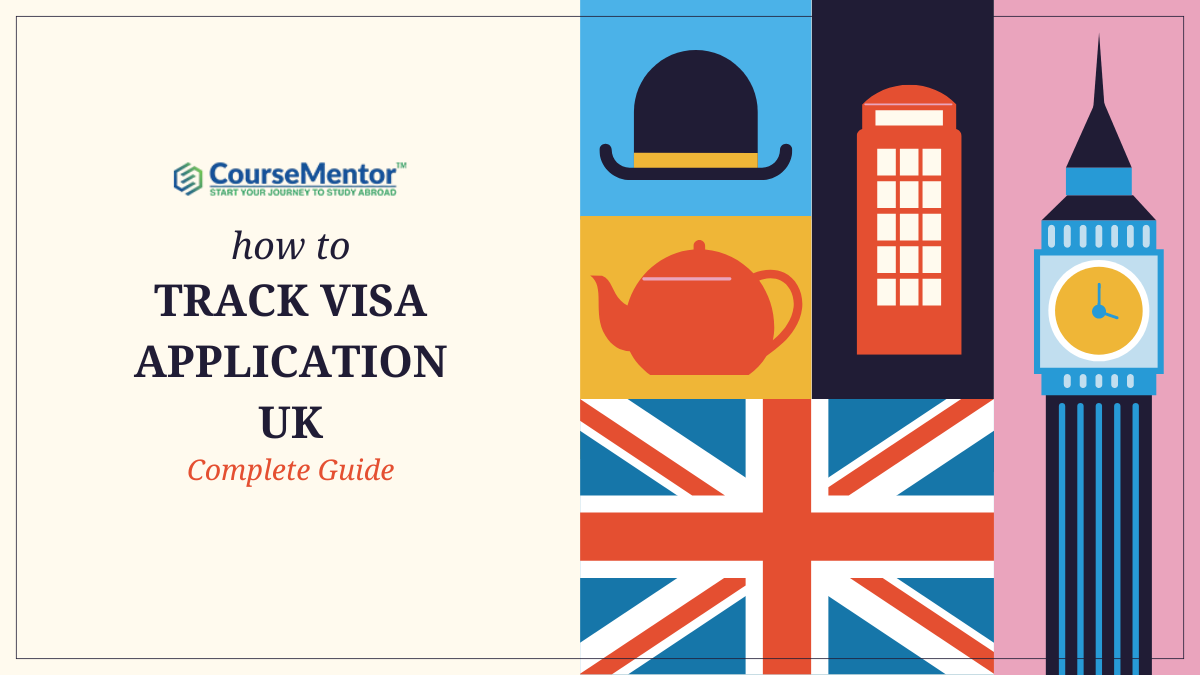






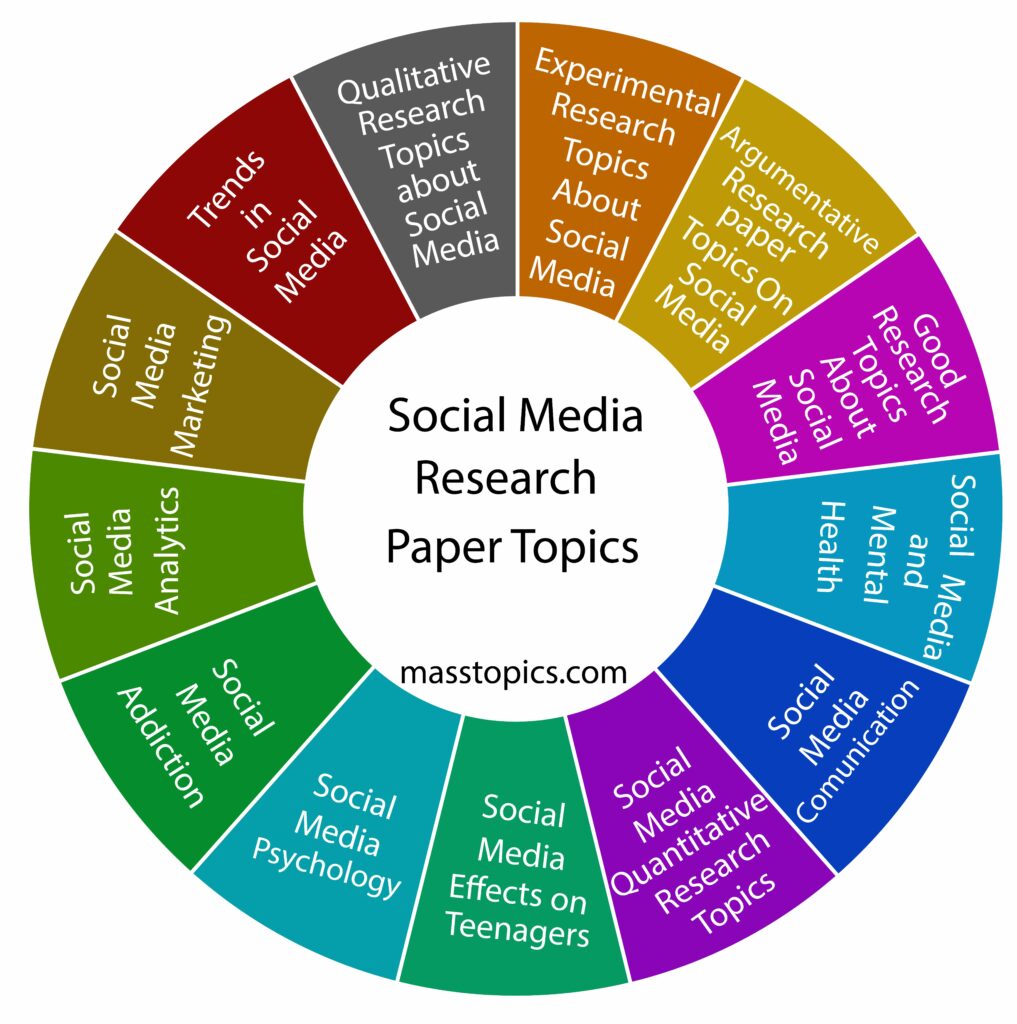









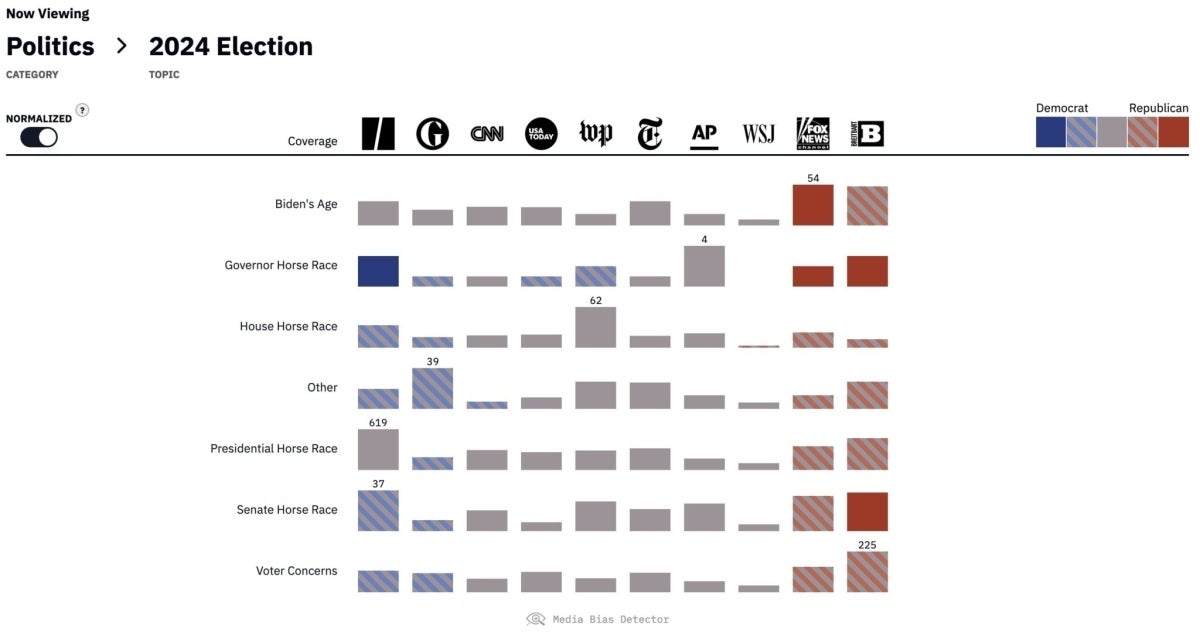



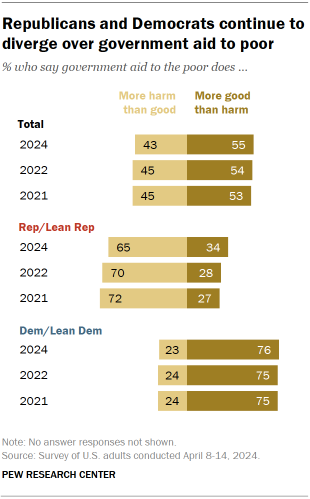
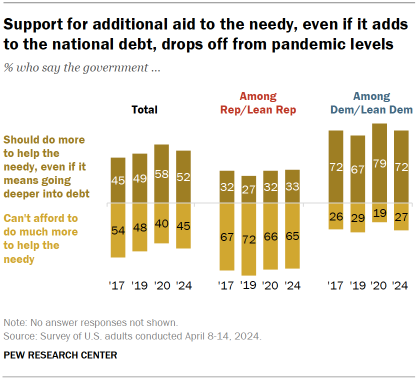
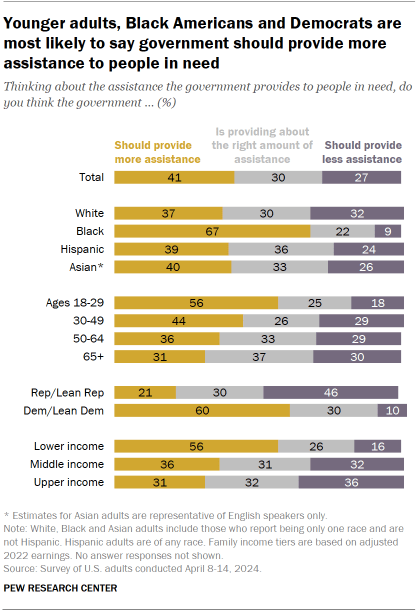
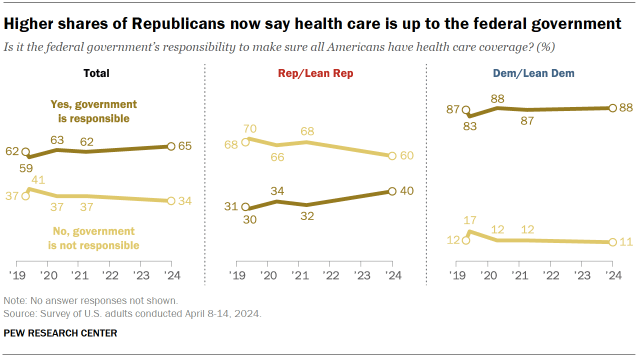
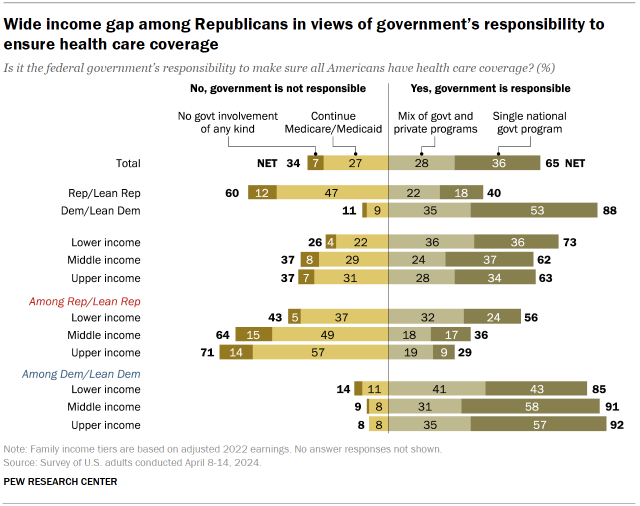
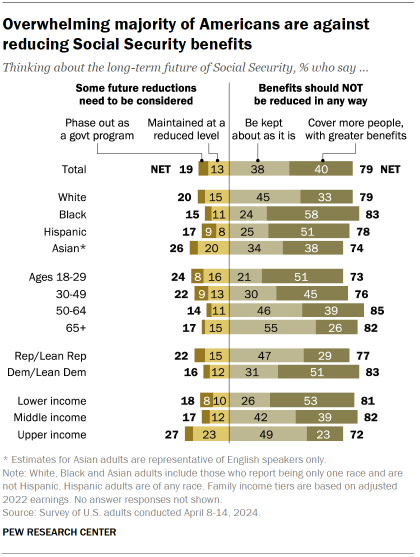
IMAGES
VIDEO
COMMENTS
Social Media Research Topics are as follows: The effects of social media on mental health. The role of social media in political polarization. The impact of social media on relationships. The use of social media by businesses for marketing. The effects of social media on body image and self-esteem.
Some social issues research paper topics to explore are; The growth of cyberattacks and cyberstalking in social media. Social media and how it promotes an unrealistic idea of life. Social media and the many impacts it has on users and businesses. Social media detox: Importance of taking scheduled social media breaks.
As a result, social media has also become a popular topic for essays and research papers. If you're looking for inspiration for your next social media essay, here are 121 topic ideas and examples to get you started. The impact of social media on mental health. The role of social media in politics.
234 Social Media Research Topics & Ideas. Written by. Victor Hughes. 18 May 2024. 2646 words. 12 min read. Social media research encompasses a broad range of different topics that delve into the ever-evolving digital landscape. People investigate the impact of social platforms on society, exploring subjects, such as online identity formation ...
13 social media research paper topics. To help you choose the right area of research, we've rounded up some of the most compelling topics within the sector. These ideas may also help you come up with your own. 1. The influence of social media on mental health.
Here are some amazing topics that you can use. The amount of bandwidth used when using social media. The negative effects of joining social media platforms when too young. The network connectivity issues that occur on social sites. The best legislations that can be put in place for social media.
Use of the Internet networks, social networks, and mobile in 2021. Facebook as a source of distribution of content and remote communication. Training of professionals toward their audiences for social media platforms. Facebook: A place of digital socialization among top social media sites.
Top 10 Social Media Research Paper Topics. 1. A Comparative Review of Facebook, Instagram, and TikTok as Primary Marketing Platforms for Small Businesses. A lot of small businesses have flocked to various social media sites to market their products and services.
Social Media Research Paper Topics. The following is a list of social media research topic that may be worth investigating: Political Campaign Topics. ... Social Media Topics Related to Mental Health. Spending too much time on social media can affect how we relate with people in real time. Such a phenomenon does have an effect on our social ...
1 INTRODUCTION. The exponential growth of social media during the last decade has drastically changed the dynamics of firm-customer interactions and transformed the marketing environment in many profound ways.1 For example, marketing communications are shifting from one to many to one to one, as customers are changing from being passive observers to being proactive collaborators, enabled by ...
Sociology Research Topics on Social Media. Research paper topics on social media are directly related to sociology. This is a platform where the context of modern culture is created. You can get a lot of information about people and their relationships. For example, write about the family institution using mom bloggers.
3. Political Opinions: Study how social media affects young people's political opinions. Look at how people only hear opinions they agree with and how false information spreads. 4. Community Building: Learn how social media helps different groups connect. Look at how these online groups offer support and share ideas. 5.
Here, we provide a comprehensive list of social media marketing research paper topics, divided into 10 categories, to help students choose a topic that is both interesting and relevant to the field. Social media marketing research is a rapidly evolving field that requires a deep understanding of social media platforms, consumer behavior, and ...
First, you start by finding research problems related to social media. To find these problems, focus on drafting social media loopholes for research. Once you've found a suitable topic, the writing stage is the next. Social media research: what it is. Social media is a virtual communication platform that promotes digitized interactions between ...
The present essay discusses the topic of addiction to social media and smartphones. Obesity Prevention: Social Media Campaign. A variety of programs aimed at reducing the risk of obesity has been suggested by healthcare practitioners and scholars. Among them, diet interventions are highly popular.
189 Social Media Research Paper Topics To Top Your Paper. Social media has been around since the late 1990s and refers to the means of interaction and communication between groups of people from all over the world. It allows them to create, share, and exchange information, ideas, and conversations in virtual communities over the internet.
Selection of the Best Social Media Research Topics in 2023 What Are The Elements of a Good Social Media Research Paper When you have an objective to explore social media research topics, you have to narrow things down because one faces the risks of addressing every aspect of the social environment.The main characteristic that one has to check when choosing a great topic on social media is the ...
Step 2. Choose a topic that sounds compelling. This might be the most challenging process if your tutor didn't provide a list of possible topics to explore. To assist you in narrowing down social media essay topics, browse sample papers online, and see if they give you any inspiration. Step 3.
199 Potential Topics For a Communication Research Paper. A communication research paper can help cap your academic career and position you for a postgraduate career. Communication research topics span a wide range of subjects and issues about how people convey information, allowing you to make unique discoveries about human behavior.
Social Issues Research Topics for a Professional Paper on the Environment. Ensuring global access to drinking water. Implementing sustainable technology in agriculture. Benefits of studying the environment. Urban gardening and food security. Deteriorating environment effect on labor conditions. Oxfam.
In this article, we will walk you through Social Media Research Paper Topics that are trending and relevant to your interests. ... Perform a quantitative assessment of social media related dilemma of conversation to examine the role of social media in communication crises and research from 2009 to 2017.
Here's the list of trending social media research paper topics. You can choose the most suitable social media research topic here. The Influence of Social Media on Political Discourse. Analyze the role of social media in shaping public opinion and political campaigns. You can also include definition of social media.
Media economics is the study of economic theories and concepts applied to the media industries. Media economics is diverse and includes such topics as policy and ownership, market concentration, performance of firms, and political economy of the media. Media research paper topics related to media economics include: Antitrust Regulation.
To assess the sentiments for each post, we used a pretrained BERT model, called RoBERTa, that was trained on social media posts. 21 RoBERTa offers multiclass labels (ie, positive, neutral, or negative classification of text) and has been used in recent studies investigating health care problems using data from social media. 28-31 To quantify ...
Members of the CSSLab discuss the Media Bias Detector . By selecting topics and publication names from simple drop-downs, visitors to the Media Bias Detector can see exactly how different publishers covered particular topics during specific time periods — easily learning, say, how many stories The New York Times has published in the last six weeks about Joe Biden's age, as opposed to ...
ABOUT PEW RESEARCH CENTER Pew Research Center is a nonpartisan fact tank that informs the public about the issues, attitudes and trends shaping the world. It conducts public opinion polling, demographic research, media content analysis and other empirical social science research. Pew Research Center does not take policy positions.
Papers may present research findings, case studies, theoretical analyses, or reviews. They should offer evidence-based, data-driven insights that advance our understanding of oral health's critical role in public health. To participate, please submit a manuscript summary for consideration and a paper before the deadline on November 29, 2024.
The full-time faculty of more than 3,100 is responsible for groundbreaking medical advances and is committed to translating science-driven research quickly to new clinical treatments. UT Southwestern physicians provide care in more than 80 specialties to more than 120,000 hospitalized patients, more than 360,000 emergency room cases, and ...
The Brookings Institution is a nonprofit public policy organization based in Washington, DC. Our mission is to conduct in-depth research that leads to new ideas for solving problems facing society ...
ABOUT PEW RESEARCH CENTER Pew Research Center is a nonpartisan fact tank that informs the public about the issues, attitudes and trends shaping the world. It conducts public opinion polling, demographic research, media content analysis and other empirical social science research. Pew Research Center does not take policy positions.